#I just wanted to talk about the Director's murder tendencies
Explore tagged Tumblr posts
Text
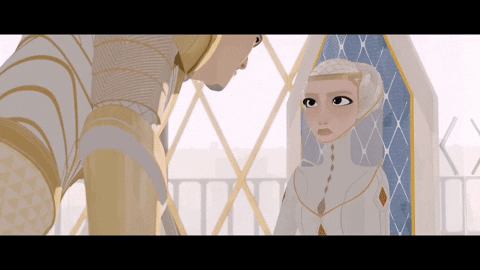
It was at this moment that she decided to assassinate Ambrosius.
She could have continued to protest Ballister's words, she could have tried to make an excuse or even sent Ambrosius back to his post. But no. She gives up extremely quickly and almost jumps straight to murder.
Is it only me who’s shocked that it’s happening so quickly?
She who does all this in the name of Gloreth has absolutely no problem killing her (as far as we know) only descendant. Which means if he dies, Gloreth's lineage is over.
Ambrosius is a Goldenloin, a noble, a knight, the very example of a knight! He's exactly what she's trying to "protect." And she kills him with her own hands. (If that's not a metaphor, I don't know what is)
But concretely, there are several reasons for this sudden choice:
She has no good excuse at her disposal, either because she had overestimated her influence on Ambrosius, or underestimated his trust in Ballister;
She realized that Ambrosius is too attached to Ballister, which means that not only will he try not to hurt him and will not accept him being killed or treated unfairly, but also that the first chance he gets, he'll take Ballister's side and not hers;
As Ballister's (only) friend, he is one of the only obstacles in making him out to be a heartless assassin;
If someone as important and influential as him were to get in her way, she will have great difficulty doing what she wants and may even risk losing her position and power;
She knows she will never be able to convince him of the "merits" of her quest;
She has a great alibi: Ballister.
This last point is very important. She can get rid of a nuisance as she wishes with complete impunity. No one is there and Ballister has already managed to sneak into the Institute without anyone noticing before then (it's not like anyone is going to accuse her instead of the 'Queen's Killer'). So she also has a golden opportunity to silence any doubt about Ballister's guilt. I mean, others could be like Ambrosius and question her again, and Ballister managed to obtain evidence that she had killed the Queen while he didn't know before that it was her, so someone else provided them to him, so the idea of him being innocent can spread. By accusing him of killing the most popular knight in the Kingdom, she ensures that no one questions his position as a monster and criminal.
It's the Institute, where knights are trained to defend the Kingdom, there's no chance that the Director didn't have access to another weapon than Ballister's. But she chose to use his sword.
But Ballister's sword was destroyed, no one will wonder about the appearance of a second?
No one asks questions about a man who decides to assassinate for no reason the person who allowed him to rise from his social condition, in public, surrounded by knights, right next to an armed man, and visibly without any plan to escape?
The more I think about it, the less sense this supposed assassination makes. It only worked because of media manipulation and because Ballister was the culprit. If the roles had been reversed with Ambrosius - in the event that they had exchanged swords (and the Director didn't notice the exchange and/or couldn't disable the attack) - it certainly wouldn't have gone that far because:
Ambrosius is loved by all and known for being trustworthy/kind/insert knightly quality. Ballister is a commoner, who, even after several years of working hard and being miles better than others, is not seen as trustworthy. People will be much more likely to make excuses for Ambrosius than for Ballister.
The Director has no interest in using the media to blame him. On the contrary, she will try to defend him and claim that he was framed.
Ballister had no excuse for having a deadly laser sword, he has no one to blame for him. Ambrosius yes. There's Ballister. Not only because it is the untrustworthy newcomer dirty commoner that his fellow knights despise, but above all it is HIS sword that was trapped. The Director and the population will accuse him of framing Ambrosius.
People will WANT him to be the culprit instead of their lovely and respected knight. They don't want the literal descendant of their hero to be an awful person who did something this horrible. They don't want the representation of the Institute, of their society to be shaken. (I'm a pro jedi fan. I know that when people want to defend their blorbos, they can go veeeeeery far, including putting responsabilities on other people, even complete innocents or victims)
In fact, this situation will be even more credible than the original one. Why he didn't plan his escape? Bc he didn't need to. Why he did that? Obviously to take revenge on better people in better situation than him, and on society itself, by targetting the Queen, leader of the Kingdom, and a Goldenloin, who's also the Kingdom's most prestigious knight and the descendant of the founder of the Institute.
#I got completely sidetracked#I just wanted to talk about the Director's murder tendencies#the question about Ballister twin swords was mine#I really thought about the logic of this dumpster fire situation#nimona 2023#nimona#nimona movie#ambrosius goldenloin#director#ballister boldheart#ballister x ambrosius#goldenheart
593 notes
·
View notes
Note
Ok so in reverse Robin aus I hate when Tim becomes redhood bc it’s really ooc for him, BUT Steph becoming the black mask after the incident but struggling with the business part (she is smart business is hard) and Tim becoming her right hand is in fact in character for him
seeing as he would not be obsessed with a dick Grayson who despite his murderous tendencies was light, and kind, and Jason who was all Robin gives me magic 😀
but instead Damian who is just as gritty as his father and a bitter Steph?
yep timmers would have a looooot less morals and a lot of money, and the second Robin needs HIS help? He is there!!!
(I don’t see him helping Bruce at all bc in canon Bruce’s grief for Steph lasted like two pages)
Oop. Your ending note is fantastic.
Let's add on, shall we?
Here's some tropes I don't prefer in Reverse Robin AUs:
Tim becoming Red Hood (Tim stealing Jason's shtick again is hilarious in the regular timeline). I will read a good fic with Tim as RH, but I prefer Tim to be Joker Junior, a completely new identity, or an Oracle-like identity.
Batman's partner being named "Robin" (that was Dick's identity he got from his parents. They should have another name)
I personally like Duke being the first one Batman adopts. Maybe Duke's parents get gassed in an alley in front of Batman, and Bruce decides to adopt Duke. The kid can still have his whole gang, and that's how Bruce decides to train Duke instead. Not sure.
Anyways, this could play into the AU you mentioned.
Damian moves on from his mantle, but Duke is still there. Steph, who Duke and Batman meet when she's Spoiler, agrees to fill in Damian's vacancy.
Tim meets Steph on the streets. He would be older than her in this. Your choice on how fanon it is (does he stalk Bats from a young age to take pictures of them), but I like the idea that he sent in cases he solved or tips he heard about.
When she dies, Damian comes home, and Duke is still there. Damian doesn't return to his previous mantle, but he's around. He's actually talking to Bruce again. Bruce thus doesn't grieve her much.
Tim doesn't see a need to step in.
Tim grieves his friend (or gf if that's your preference). Perhaps he goes abroad for a bit to distance himself from the city. There's bound to be some international programs his parents would like for him to take part in. Perhaps he still gets that Lady Shiva training. Dealer's choice.
After a year or two abroad (and if he got training, he learned from more teachers), Tim hears news about someone trying to rival Black Mask.
Since Black Mask took Steph from him, he sees this as a possible chance for revenge. He returns to Gotham.
I don't know if Steph would take up the mantle "Black Mask," but I could see her taking up a moniker that would mock the man (like White Veil, Lilac Cover, or something).
During her time "dead," she ends up getting training. Not sure who'd train her, but she learns more than Bruce ever taught her. Perhaps Helena and her end up chatting?
She's clever, and her father helped her knowledge on the criminal workings of Gotham. She utilizes her skills to gather people on her side and make them loyal to her (by providing great worker benefits, ig).
Tim offers his services to her gang without knowing it's Steph as the head (he plans to ruthlessly use them to get his revenge). Dealer's choice on whether Steph immediately lets him in or doesn't trust him (due to trauma with her death and shit).
Tim does some of the business and intel gathering. He occasionally goes in the field as well. Steph is the main brawns, gang director, and manager. She knows how gangs work, what her people really need/want, and how to manipulate the playing field. Tim can learn these things and suggest moves to Steph, but leaves decision-making to her.
Bruce, due to not knowing Tim, hasn't had the chance to instill tension between Steph and Tim. They have issues like all relationships, but they work it out. There's nowhere near the amount of shit there is in canon.
Maybe Tim's parents are dead by the time Steph gets back. Either way, I hope Crystal learns that her daughter is alive again
85 notes
·
View notes
Text
Entry A: The Victimhood of Alex Kralie
So. Here we are. I made a post on the internet wanting to talk abt Alex as a victim so here we are. For anyone who has no idea what I'm talking about, I'm talking about the YouTube Series "Marble Hornets." Tldr: it is the predominant and first Slenderman series after Viktor Surge posted his photo edits to Something Awful Forums.
Today, I wanna talk about the seconary antagonist of Marble Hornets, Alex Kralie. It's not that I've seen people outright villify Alex and not acknowledge the influence of the Operator, but I have noticed a tendency to assume outright malice from Alex.
Sure. I have cracked a fair share of jokes about Alex quote "being the true villain of MH cuz he hit Tim on back of the skull with a pipe and then left his d*ck out for several hours" or about how Alex's solution was "gun with less kitchen" and my personal way to spoil but not spoil the comics-"probably fell in The Hole." It's fun to dunk on Local Alabama Man number 3047.
But Alex isn't like that of his own accord. We see it in all of Season 1 and in chunks of 2 and 3. Alex was at one point a decent dude to hang with even if you weren't his immediate friends. Sure he was a pretentious college film director, but I feel like you have to be if you're a college film student. They even acknowledge in the series that Alex being stalkee by the Operator is likely what caused the shift.
"What about all the murder?" Asks some strawman who is not here and no one is probably aaking. So, Alex commits his murders under the impression that once everyone who was involved on the film is dead, the Operator will disappear. White shirt guy waa a fluke I think. I dont think Alex wanted to kill a civillian. But from the second he made contact with Alex, white shirt guy was now a part of it. And without knowing it, Alex was feeding theArk.
Alex never once does the bidding of the Operator, at least not intentionally. I think he was doing what he thought was best, even if to the outside perspective it's a horrific series of him murdering his friends. I don't think it was all good intent, but I don't think Alex took joy in having to kill them all. Even his last words to Tim tell me that.
"This isn't over, you see how it spreads. If there's someone left, you'll have to kill them, and then yourself."
I think us seeing Alex in the amalgam conciousness of Skully adds to this, making it more tragic. Alex can't even talk anymore. He just screeches. No longer the man his friends knew.
"You are Broken." And Alex is a victim who in his attempt to do the right thing, committed horrible crimes, and fed the thing he tried to stop.
#I could go into about how this is the whole thing of “Oh Alex isnt a saint and you know how the internet is LOL” but thats a can of worms#mh alex kralie#alex kralie#marble hornets#mh alex#slenderverse#Marble Hornets spoilers#Marble Hornets Comics#Marble Hornet Comic Spoilers#MH spoilers#MH comic spoilers
16 notes
·
View notes
Note
lesbian curtwen hcs please 🤲
OK a lot of my thoughts about them are very much half formed and just sort of floating around in my brain so i don't really know how to verbalise them (something i should have thought about before i posted lmao) but they are very much there. so.
cait (aka agent caitlin mega) is like if u took curt mega and put him in his ultimate nightmare situation. missions are way less dangerous and exciting and being a woman in the 50s means she can't dress how she wants (at the start of her career she's very butch but as the lavender scare approaches she changes her clothes and hair to draw less suspicion. she still wears pants whenever possible and cuts her hair as short as 50s standards will allow though) and she's underestimated by her peers despite the director of the a.s.s. also being a woman and generally improving views on female spies in 50s america. unlike canon curt her confidence, recklessness and physical strength don't get her much respect as a spy or as a woman in general. so that combined with the inherent loneliness of the job means that when she meets ollie carvour (who understands the experience of being not only a female spy but also a lesbian in the lavender scare) they immediately form a strong connection and it doesn't take long for both of them to start catching feelings. i think in general these guys would be a little more emotionally open with each other than i think canon curtwen would, considering for women there was less stigma around showing vulnerability. but they're still stubborn asses in a very competitive and ruthless profession so it's not too dissimilar.
ollie (aka agent olwen jane carvour) is not quite as different to canon but i wanna talk about her anyway just for funsies. historically britain's views on female spies were generally more conservative than the us so based on that olwen would have had to work harder to be taken seriously. however, she has an advantage over cait in that she fits 1950s standards for women (in espionage and in general) both in her general style and mannerisms and her manner of working - stealthy and methodical as opposed to cait's tendency to wing it and blow shit up. ollie uses people's impressions of her to her advantage, blending into social events seamlessly as a charming young debutante despite being downright murderous. this tires her to no end, and until she meets cait she feels like she has to entirely mask anything even slightly non-heteronormative about her to succeed in her job. then she meets this bold, reckless american agent who keeps her hair just a bit too short and never seems to wear skirts, and she suddenly feels seen.
but yeah they're gay or whatever
20 notes
·
View notes
Text
I listened to the first episode of the Burn Noticed podcast today, where they talk about the pilot. I largely agree with what they say about it, which sums up to... it's not very good. (In all honesty, if I'd watched this pilot blind, I would not have come back for episode two. The only reason I kept going was because the show had been recced to me by a friend whose taste I largely trust, and he said it was great fun.)
The podcast mentions that the director never directed an episode of Burn Notice again, which is telling. And that he rarely directed more than one episode of any show, which is even more telling 🤣. They mentioned some specific details about the directing which I found interesting, because I know pretty much nothing about it. Directing has basic rules of 'how to shoot scenes' which makes sense - like the rules of grammar, they're there for a reason, and that doesn't mean you never break them, but it does mean that you break them for a specific effect and you'd better know exactly why you're doing it. Which is very different from just having bad grammar...
One of the main reasons the pilot doesn't work for me is that the characters aren't right yet. Michael is close, but still has odd moments, like the puppy dog thing with Lucy, which is a tendency he never shows again. Fiona and Sam, my two favourite characters, are so far off that I actively disliked them. Fiona is reckless to the point of stupidity, casually suggesting they murder FBI agents. Sam is sleazy and gross, openly leering after women half his age who are just walking along the street minding their own business. You can spackle those moments (and I do!) but it would be better if we didn't have to...
The podcast talks about how the Nigerian opening scenes are very poorly explained, and we don't really know what's going on, but I think that was deliberate on Matt Nix's part, and a smart move, honestly. You don't want to alienate any part of a pilot's audience by painting any particular place in a bad light. Michael also says in the pilot that he's not a CIA employee per se (which is later thrown out because he absolutely was) and that makes sense too - whether the CIA are drawn as good guys or bad guys, you're going to piss off one section of society by stating it outright, so they shoved that under the carpet for later.
On the podcast itself, the two presenters are fun and personable, but they ramble. A lot. I hope in the future they get more structured and plan ahead, because they kept starting one conversation, getting sidetracked, and then saying, "Wait, we can come back here later. What were we talking about before?"
They also don't seem to know a lot about Burn Notice 😱The woman admits that she loved it when it aired, but she dipped in and out and never saw the whole thing right through. The man does claim to have seen it all, but obviously not recently, as there are factual inaccuracies. Neither of them know that Sugar is a character who returns in future episodes, in one specific example.
I agree with some of their criteria for deciding what makes a good episode of Burn Notice, but not others. They may adapt as they go on, who knows? As with Burn Notice itself, I'm willing to push past the dodgy pilot and listen to more of this podcast in the hope it gets better. We will see!
4 notes
·
View notes
Note
For the writer’s commentary-
I know you don’t really work on it anymore, but can I ask about Come Now Little One?😁
Hi, thank you!!! 😊
Come Now, Little One! Oh, I love this one so much! It's been almost a year since I updated it, oh my gosh. (I assure you, I am still working on it, albeit slowly!)
Director's commentary....(this will probably just be a ramble)
I'm not really sure what made me crossover the story in the way I did, to be honest. I just heard a song and ran with it back to my fandoms.
I really like the idea of dark!Helen, and Sam being connected to the Sanctuary, but also determined to go her own way and eventually end up at the SGC anyway.
One of my favorite parts of the story is exploring Sam's relationship with the other characters. How she feels growing up with this version of Helen as her mother, her relationships with James, Biggie, and Barney, who do try to shield her from Helen's darker tendencies, but feel like they failed her anyway. The cruelness of them realizing that they did fail her, so they try even harder with Henry and Ashley and succeed far better. We'll also have later scenes where Sam meets Jacob and he becomes another parental figure to her, leaving Sam to reflect that while she's had plenty of people fill the gap of her father, she's only ever had Helen as her mother. Declan is also going to be an important character to Sam through the story, her childhood comrade, her first love(r), and the other person who also leaves the Sanctuary Network for the military, only to rejoin it years down the road.
Also, Sam knowing from a young age that her father is the Ripper, so she feels she came from two very messed up parents and is secretly worried she'll end up like them, especially since Helen murdered a man in front of her.
Her reprieve in London (in chapter three) is rather bittersweet, because she needed the time, she wanted the time away from Helen, but she does have to go home eventually, to a mother whose 'doing what's best for her daughter' doesn't always align with Sam's real needs.
I have multiple scenes that take place further down the line, when Sam is struggling to be her own person and with the guilt of realizing that if she does take the leap, she's leaving behind two younger siblings.
Through the years, she and Helen do attempt to repair their relationship, and Helen's pregnancy with Ashley (when Sam is fifteen/sixteen) and Ashley's birth bring them together for a while, because this is a person they both love and have been waiting a very long time to meet.
My plans are to, admittedly, skim over Sam's SG-1 days (for fear I'd just be monotonously repeating episodes) until the story joins Sanctuary's canon timeline, where she has to make the choice to go back to what she tried to leave behind and whether or not she tells her team (now scattered) her full backstory.
When Sam joins the Sanctuary gang, as a more understanding (but no less wary) adult, she doesn't always change things for the better, despite her best efforts.
Basically, over the planned course of the story, Sam experiences quite a bit of growth, going from a child fighting hard against her jaded, world-weary, hard-ass mother, to a woman coming to her own understanding and choosing who she wants to be.
(oh my gosh, I just realized I can have time-traveling Helen meet time-traveling Sam in 1969!!!!!!! *screams*)
Okay, so I didn't talk much about the published chapters, but this ramble was long enough without them. XD
#truedairship#thanks for the ask!#ask answered#i love this story so much i can't wait to get back into it#thank you so much for asking about it
3 notes
·
View notes
Text
1/29 Blog
Personally, I liked the film “Rashomon” by Akira Kurosawa but I did find it a little boring in the beginning when the woodcutter and priest are simply talking to each other and then there’s a very long scene of the woodcutter trekking farther and farther into the woods. However, overall, I believe “Rashomon” did a great job of delving deep into the complexities of human nature and the elusive nature of truth. It was set against the backdrop of a crime and its aftermath, and it presents a unique narrative structure that challenges conventional storytelling and explores the subjective nature of perception. At its core, the film revolves around the rape of a woman and the murder of her samurai husband, told through the perspectives of four different characters: the bandit, the wife, the deceased samurai (via a medium), and a woodcutter who witnessed the events. The film's narrative structure, characterized by conflicting and subjective accounts, allows Kurosawa to explore the idea that truth is inherently elusive, shaped by individual perspectives and biases. The narrative unfolds as a Rashomon gate, a traditional Japanese gate said to be constructed with a dual purpose, symbolizing both the entrance to a sacred place and a barrier against evil. Similarly, the gate in the film serves as a metaphor for the layers of truth and deceit that the characters navigate. Each version of the story is presented with its own set of truths, leaving the audience in a constant state of uncertainty. Kurosawa also employs a non-linear storytelling technique, which is different from the linear narratives prevalent at the time. This approach not only showcases the director's creativity but also prompts viewers to question the reliability of the narrators. The audience is left to ponder whether any of the characters are telling the whole truth, or if each account is a construction intended to preserve their own self-image. The film also explores the theme of human morality. As the characters recount the events, their versions differ significantly, challenging the audience's perception of good and evil. The bandit's account portrays him as a skilled and honorable warrior, while the wife's version depicts him as a violent and opportunistic criminal. These stark contradictions raise profound questions about the inherent subjectivity of morality and the human capacity for self-deception. Overall “Rashomon” is a great film that challenges audiences to grapple with the enigmatic nature of truth and addresses themes like perception, morality, and the human tendency to lie. Finally, I just wanted to mention a scene I thought was funny. The wife is crying on the floor and then she randomly starts laughing and gets up and says “If you are my husband, why don’t you kill this man? Then you can tell me to kill myself. That’s a real man” She then goes on to insult Tajomaru and both him and her husband look like wounded puppies and her speech gets them to fight each other.
The image below is from the scene I just discussed.
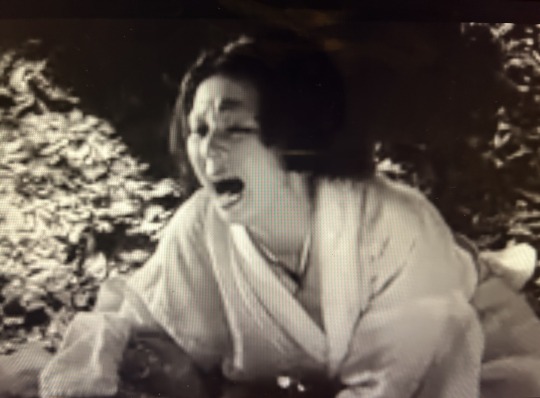
0 notes
Note
yo. I was hoping to put a request in for a yandere headcanon about Rui from Project Sekai. He doesn't seem like the most dangerous type but I feel like he still has potential!
general yandere headcanons - rui
rui kamishiro - project sekai
author's note: hi, thanks for the request! rui definitely has some yandere potential hehe~ i hope you enjoy!
warnings: general yandere themes, unhealthy relationships, stalking, manipulation, guilt tripping, mentions of kidnapping, brief mentions of abuse, brief mentions of murder
word count: 1560
what kind of yandere are they?
First of all, I can see Rui being an obsessive yandere. He’s generally a very curious person, especially when it’s about the things that he’s interested in, so he’d likely take the time to learn everything he can about his darling.
This desire to know his darling well also makes Rui a bit of a stalker yandere. However, I don’t think he’d stalk his darling in the “traditional” way. I can definitely imagine Rui using his drones or other robots to spy on his darling from far away.
Rui can also be a little manipulative at times. Most of his manipulation would come in the form of guilt tripping, but he’s not afraid to use other methods. For example, if his darling is the confident type of person like Tsukasa is, Rui would try to praise them as much as he could to get on their good side. Additionally, if his darling returned his feelings, he would 100% use that fact against them to get them to stay no matter what.
Additionally, he would probably try to monopolize his darling’s time as much as he can, which does make him slightly controlling. After all, he’s already busy enough with his job as the director of Wonderlands x Showtime, so what’s the harm in trying to convince his darling to stay with him in his free time?
how do they treat their darling?
Rui is generally a very soft yandere. He’s also quite good at hiding the evidence of his stalking and other obsessive tendencies, so there’s a good chance that his darling may never find out about his yandere side… unless he slips up, that is.
He would watch his darling from afar for quite a bit, but eventually he’d get impatient and approach them to try and befriend them. He’d be nervous on the inside at first, being careful with his words so he doesn’t scare them away too soon. Rui would also be guilty of purposefully creating situations where his darling has to talk to or spend time with him; for example, randomly and “accidentally�� crashing one of his drones right next to them and then offering to see if they have any injuries from the crash.
However, when Rui does become friends with his darling, he’ll treat them like he treats the Wonderlands x Showtime crew and his other friends, such as Mizuki. His darling will be subject to a lot of theatre-based rants from Rui, and he would definitely proudly show off any of his robots (but maybe not the ones he’s been using to spy on them).
For the most part, Rui acts rather normally around his darling. However, every once in a while, he’d get too excited and say something that he really shouldn’t know about them, or seem a little too confident about where he was going when going over to their home for the “first time”. A more observant darling may be able to pick up on his yandere side after these little slip ups, but Rui would do anything to hide it from them. The last thing he wants is to scare them away.
I don’t see Rui being very physically affectionate with his darling, since he’s more concerned about spending time with them. However, I do think Rui would often tell his darling how much he appreciates them, especially if he is in a romantic relationship with them. He really wants them to know just how important they are to him. It’s very sweet, if you ignore the concerning level of devotion lying underneath his words.
Any type of abuse is off the table. Rui loves his darling, after all, so he doesn’t see the need to injure them or hurt them in any other way. That being said, manipulation through guilt tripping or taking advantage of weaknesses is a fairly normal occurrence with him, as I mentioned before. Another thing that’s completely off the table is murder. Rui would never murder his darling or anyone else, no matter how bad things got.
I don’t think Rui is very likely to kidnap his darling. He’d see that as crossing a line that shouldn’t be crossed. There is a chance that he’d do it if things got really out of hand (say, his darling started dating someone else and isn’t responding the way he wants to his implicit suggestions of breaking up with them), but it’s generally very unlikely.
Overall, since Rui’s actions are very calculated and he treats his darling well, there’s a feasible chance that he can maintain a normal relationship with them on the outside, whether that be a friendship or a romantic relationship. However, if things went south and his darling found out about him stalking them, Rui isn’t afraid to use a little more manipulation to get his darling to stay with him. He’d never hurt them too bad though. He doesn’t want to see them in pain, especially not if he’s the cause of it.
what kind of person would they obsess over?
I think Rui would be attracted to someone who’s very passionate about their interests. After all, he is friends with Tsukasa, who is arguably one of the most passionate people in Project Sekai. Rui himself is very passionate as well, so that helps. He’d love nothing more than to sit down with his darling and exchange ideas with them - either about his shows or robot building ideas, or about whatever they’re interested in.
Rui may also fall for someone who is a bit of an outcast, just like him. Up until joining Wonderlands x Showtime, he never had many friends, and he struggled to find people who accepted his more eccentric ideas. That’s why he would be very understanding and empathetic towards someone in a similar situation to him, kind of like he is with Mizuki.
It’s also worth mentioning that if Rui falls for the outcast type of darling, he would be very protective over them. I can see him coming to his darling’s aid if they’re ever being picked on or made fun of by other people. He knows what it’s like to be alone, so he doesn’t want his darling to have to feel the same pain. They have him, after all!
In addition to being protective over his darling if they were being treated badly by others, Rui would probably increase his drone surveillance of them to make sure that they’re safe; and if they aren’t safe at any moment, he knows immediately and can intervene before things get ugly.
are they aware of their actions? how dangerous are they?
Rui is a very lucid yandere. He’s quite aware of the fact that what he’s feeling is not the normal way to feel about someone you love, to the point where he sometimes feels a little guilty about what he’s doing. The guilt comes out especially when he finds himself hiding things from his darling or lying to them, but he considers it a necessary sacrifice. After all, he ultimately wants to be by his darling’s side, so if he has to stalk them or guilt trip them to achieve that, he can handle whatever remorse comes as a side effect.
Overall, Rui is not a very dangerous yandere. He treats his darling nicely, and he tries his best to keep his more intense actions and feelings away from their sight. Like I mentioned before, he is capable of maintaining a normal relationship with them despite what he’s doing behind their back, and there’s even a chance that they’d never find out about his obsessive tendencies due to how well he conceals them.
what is their most dangerous trait? how far would they have to be pushed to bring it out?
Rui’s most dangerous trait is his intellect and his high capability for quick thinking. He’s a very intelligent person, and he’s good at coming up with plans on-the-spot in response to a sudden change or development in his environment. That’s why I think it would be really hard to escape from him.
I don’t think Rui would give his darling many opportunities to get away from him in the first place. If he hasn’t kidnapped them yet, he’s not afraid to get in their face and manipulate them into spending time with him if he noticed they were getting distant. And if he has kidnapped them, he’d keep an almost constant watch on them, either directly or through his robots and other electronics.
However, if his darling ever was able to escape, Rui would do anything to get them back. He’d stay surprisingly calm despite the stress of losing them, and his head would be filled with ways to get them back into his clutches… and keep them there. At that point, if he hadn't already kidnapped his darling, he would.
Although he is still against physical/verbal abuse and murder, Rui would take no shame in playing mind games with his darling should they ever get away from him. The guilt tripping would evolve into plain old manipulation, and Rui wouldn’t try and hide it either. If his darling has gotten him to the point that he’s forced to kidnap them, he doesn’t see much of a use in hiding anymore. As they say, the cat’s out of the bag.
#yandere#tw yandere#yandere x reader#yandere x you#project sekai#project sekai x reader#yandere project sekai#yandere project sekai x reader#rui kamishiro#rui kamishiro x reader#yandere rui kamishiro#yandere rui kamishiro x reader#kanata-writings
191 notes
·
View notes
Text
Face/Off
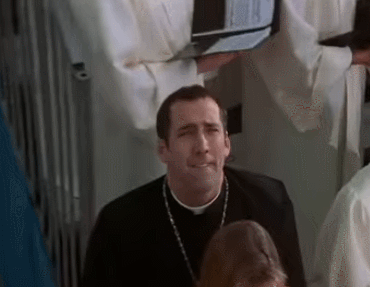
OK, so this might be cheating a tiny bit because technically I have seen this movie many times and no one EXPLICITLY requested it. But Wife believed that, and I quote, “the people would really want to hear” my thoughts about this one. So here we are, watching John Woo’s masterpiece, Face/Off for the first time in probably 10 years or so, and man oh man is there a lot that I forgot about this movie. For the uninitiated, this is the classic tale of John Travolta and Nicolas Cage swapping faces - it’s kind of like The Parent Trap if one of the Lindsay Lohan twins was a professional...bad person? (It’s unclear what Castor Troy actually does besides fuck shit up) and the other twin was a high-ranking FBI agent. Oh and the first twin killed the son of the second twin. Ok, so it’s not really like The Parent Trap. Full disclosure: I apologize for nothing. I unabashedly love this movie for every single ridiculous moment of its 2 hr 19 min running time. And I saw this in THEATERS. I was TEN YEARS OLD. And before you start judging my parents too harshly, this movie inspired a very healthy fear of both drugs and plastic surgery into me, so really it was more effective than most D.A.R.E. programs according to the data, so I say once again - thanks John Woo!
Some thoughts:
TWO HOURS and NINETEEN MINUTES. It’s frankly ridiculous, and if it were any other director I would say learn to edit, man, but John Woo really knows how to make a slow motion shot work.
Castor (Nic Cage) is so much more disgusting now that I’m grown. Like, when I was a kid he was just a cartoonish villain, but now his rampant misogyny and sexual predator antics at every turn is WAY more creepy and disturbing than his tendency to just shoot people.
More people should follow John Woo’s lead - this motherfucker loves sparks in his action scenes, and they’re so much more visually interesting than just plain explosions. Broke: you shoot a car’s gas tank and it explodes. Woke: You shoot the engine of a passenger jet and a shower of sparks goes everywhere.
This is Academy Award winner Nicolas Cage’s finest performance, tbh. He gets to go full unhinged crazy pants for half the movie, and then turn on a dime and play the determined no-nonsense FBI man. I genuinely love Nic Cage with my entire heart, because he - has - the - range.
One underrated thing about this movie is its score. The funky bass line when Castor first arrives, the overwrought strings during every chase scene, the triumphant orchestral swell when Sean stages the prison coup - it’s so cheesy and SO good.
Reason #57 this whole face switching plan is insane - they did no psychological exam or evaluation to determine whether Sean (John Travolta) would lose his damn mind by going through the intense trauma of wearing his son’s murderer’s face. You’re telling me he didn’t have to fill out a single form before they cut his literal face off? If I know anything about the government, I know there would be so much paperwork involved before anyone’s face was going anywhere.
Why are we not talking about the massive problem it is that there exists a prison where “the Geneva convention doesn’t exist” and that Amnesty International has never heard of? Like, Castor is a bad guy, sure, but we’re supposed to just be fine with this? This is the precursor to the raft prison they built in Captain America: Civil War that is meant to house literal superheroes and is completely off the grid. That’s not okay! The copaganda runs so deep, it genuinely boggles my mind that I grew up watching movies like this and only now that I’ve unlearned so many things can I even recognize how absolutely fucked up it all is.
John Travolta doesn’t get enough credit for this movie either - all the attention goes to Nic Cage and his bonkers facial expressions, but Travolta is having the time of his goddamn life doing his little dances, singing his little songs. We all know he loves musicals, and I love that he gets to showcase that here but through villainy.
Sean’s entire escape plan hinged on Dubov (Chris Bauer) getting his brain fried first, but he had no way of knowing that would be the exact moment Dubov would be in the clinic getting fried.
Also one of my favorite things is that during the escape when one of the guards is burned by acid he screams the same scream that was used in the credits for Aah! Real Monsters.
Oh and we have to talk about the fact that Sean escapes the prison by just - jumping in the fucking ocean? How did he not die? How did he get to land? And the helicopter just STOPPED LOOKING for him? Didja spend all your money on magnetized boots so the “helicopter that searches for escaped prisoners” fund ran dry in your terrifying war crime prison budget?
In retrospect, I should have realized that I was into women based on how very hard I crushed on Gina Gershon in this movie. Velvet top with satin pants and the Jennifer Aniston haircut? SO INTO IT.
Taylor Swift is re-recording all her old masters now, right? I’m just saying, I really think she would be smart to collaborate with John Woo on a new video for “Sparks Fly,” because, and I can’t stress this enough, NOBODY loves sparks more than John Woo. Nobody.
What even is this building Dietrich (Nick Cassavetes) lives in? It’s like an airplane hanger but there are stairs and black lacquer furniture, but there’s like a basement lobby thing that’s all marble and tile and a circle of mirrors and giant plants? Who designed this? Is it a hotel? I have so many questions.
I know that the benchmark for future technology is the flying car, but I ask you, how is it possible that we don’t live in a world where people can swap faces like this yet? Or DO WE and it is all just black ops operations like this. Oh lord, I’m probably gonna start getting batshit crazy QAnon type conspiracy Facebook ads now that I’ve typed that sentence on the internet.
Also pretty fucked up that Castor - as Sean - sleeps with Eve (Joan Allen) and both she and the real Sean are just kind of like “yeah I know, rape by deception really sucks, guess we’ll just have to deal with it.” Like how much therapy does this whole family need now??
What kind of church is this where doves are just flapping around INSIDE the entrance by the remembrance candles? And there’s just so many of them. Like at least 30 doves. Doesn’t that feel like too many doves? You know what, nevermind, I shouldn’t have doubted John Woo’s vision - keep the sparks and doves coming, buddy, I’m here for it.
There’s no way you drive a boat THROUGH ANOTHER FUCKING BOAT and emerge completely unharmed.
Ohh teen daughter Jamie (Dominique Swain) doesn’t have her nose ring anymore! That’s how you know she’s no longer broken.
And Sean just brings a new 5-year-old son to live with them and everything is totally fine, as if no time has passed. That’s how you heal collective trauma, right? By simply replacing your murdered son with a different 5-year-old boy? Ah, the 90s.
Everything about this movie is exactly what I want movies to be like. You’ve got great villains who are really in it for the DRAMA of it all, you’ve got stalwart and true (read: repressed) heroes who are willing to do what it takes to get the job done, and you’ve got more sparks and doves than you know what to do with.
If you liked this review, please consider reblogging or subscribing to my Patreon! For as low as $1, you can access bonus content and movie reviews, or even request that I review any movie of your choice.
#121in2021#face/off#face/off review#face off#john woo#nicolas cage#john travolta#joan allen#nick cassavetes#dominque swain#movie reviews#film reviews
33 notes
·
View notes
Text
Headcanons for sex with Will throughout the seasons
I really don’t know how to make these titles shorter I apologize lmao
Will Graham x reader
Warnings: this is all smut
Requested: by anon, I loved your reply to how sexually motivated Will Graham is I think about it quite a bit too. Could you please do a head cannon on what sex with him would be like? Like how often he’d have sex with reader in the first season vs after first season and if he’s rougher during sex after season one or if he’s still pretty gentle?
I don’t own these characters. They belong to author/director
Author’s Note: I don’t usually do smut and then I did this and it’s much longer than any of the other headcanons I do so I guess I should do it more lmao. I hope you enjoy as much as I did! I love Will Graham.

-whew
-will gRAHAM
-okay so let’s start with season one because that makes sense
-this Will typically is very gentle with you
-he still has those tendencies that he will adapt to love later where he becomes more dominant
-so do expect that at this point he will on occasion be on top and take control even if it is usually very rare
-usually though it’s more of a love-making type of sex
-he never initiates it and will do it if you have the want (unless he’s really not in the mood then he will kindly decline which you understand)
-it’s slow and sensual
-he likes to to be able to touch every piece of you and lets his hands wander
-big fan of holding your hair, never tugging to hard but definitely bunches it up and messes with it so you can barely brush it after
-he likes after sex peace
-that’s his favorite part really if you asked him
-because then you’re either naked or in his clothes and he has a moment of just peace as you sit together, laughing at each other and talking and having broken the ice
-season one Will needs someone to hold him more then he needs someone to fuck him
-granted, he does like to use it as a stress reliever
-I mean we’ve seen him stand up and teach a class like he’s never been laid in his life so he appreciates it when you take it into your own hands and helps him out that way
-awkward too I would imagine until you’re very comfortable with each other
-post jail tho
-it was in jail where he came into his own about murder and also sexually
-he hadn’t gone that long without you since before you so it’s very frustrating
-the second he’s out his lips are on yours
-he is still broken and will still need your help for most of the duration for season 2 but there is definitely a difference
-at this point he’s figuring himself out and able to feel confident about it which is the biggest change
-he’s glad to have you with him during this time
-SEASON 3 THOUGH
-sigh
-slutty Will begins
-around the time that he is going to get Hannibal in Europe that man has lost every single ounce of care in his body about anything in the world
-he’s a murderer
-and therefore a top
-I do not make the rules
-his sex drive has gone up because he’s figuring out how to make it fun
-bonus points if he’s just murdered a man/hung out with Hannibal
-there’s a different way in the way he carries himself
-at this point he is a BIG fan of teasing and that is his obsession
-because now he has the confidence and the means to do it and do it well
-really well
-unbelievably well dammit
-Europe Will is peak slut Will
-around the second half I’m assuming you’ve been together a long time and are married
-no boundaries at that point
-okay so when Will comes back to see Hannibal whatever tame he had in those couple of years is out the window
-picture it
-you’ve just fallen off a cliff with two murderers, one of which is your husband
-and now all you can do is make food out of people and have sex
-it’s peak living tbh
266 notes
·
View notes
Text
Arkham Files: Mirror Master II (Evan McCulloch)
Hugo Strange: From the patient files of Dr. Hugo Strange, director of Arkham Asylum. Patient: Evan McCulloch, also known as the Mirror Master. Yes, there are apparently two of them. This is the younger one. (Pause) The patient displays a number of antisocial tendencies, admitted to having a cocaine addiction in the psychological evaluation that was administered to him upon his arrival at Arkham Asylum, and most likely also suffers from Schizophreniform Disorder or Schizoid Personality Disorder. Session One. Hello, Mr. McCulloch.
Mirror Master: Howzitgoan, Dr. Strange?
Hugo Strange: Pardon?
Mirror Master: Ah wiz like, “Howzitgoan?”
Hugo Strange: Are you...are you all right, Mr. McCulloch?
Mirror Master: Aye. I’m doin’ awright. Cannae say the same for yeh, I’m afraid. Ye look loused; like ye haven’t had a good kip in yonks.
Hugo Strange: I..you...what?
Mirror Master: (Laughs) Dinnae get yer knickers in a twist, chief. I’m just having a wee bit of fun with yeh. Always quality to watch the reactions of you Yanks when I use the full Glasgee burr. Pure deid brilliant, so they are!
Hugo Strange: (Muttering) Glasgow? Well, that explains his incomprehensible accent. (Aloud) I take it you’re from Scotland, Mr. McCulloch?
Mirror Master: Aye. Lived in an orphanage in Kirkcaldy as a wee lad; then ran away tae Glasgow, the city of culture.
Hugo Strange: So, how did a Scotsman end up working as a costumed criminal in the United States?
Mirror Master: A group of American corporate and government high heejins had heard that I was good at makin’ problems disappear. Offered tae dircht my slate and give me all the dosh I could ever want if I made their problems disappear, tae. Sounded hoora good tae me, so I accepted. Gave me some of the Mirror Master’s gear and one of his auld costumes; sent me after a superhero named Animal Man. Had a square go with him; but when my bosses told me tae murder his Kelly Ann and their wee ones, I quit. Told them there was no way I was gonna kill a woman and her weans; then trapped ‘em all in a mirror dimension. After that, I decided I wanted to meet the man who built all the mental tech I’d been using. I followed Sam Scudder’s trail to Central City, decided I liked it there, and joined the Rogues. They’re good lads-for bad guys, I mean.
Hugo Strange: So you didn’t come here to fight the Flash?
Mirror Master: Flasher? Naw. Never planned tae end up fightin’ him...but it kinda comes with the costume.
Hugo Strange: Yes. The costume. Why did you keep it, Mr. McCulloch? The technology, I can understand...but why the costume? What benefit does it serve?
Mirror Master: It’s a fashion statement, int it no? (Laughs)
Hugo Strange: Mr. McCulloch, what sort of statement do you think you are making by wearing that garish leotard? The costume isn’t even yours; it was created by Mr. Scudder.
Mirror Master: Naw, chief. It was made by Gambi.
Hugo Strange: Who?
Mirror Master: Paul Gambi. He’s our tailor.
Hugo Strange: You...have a tailor?
Mirror Master: Aye. What, d’ye think a bunch of career criminals ken eno about sewing tae make their own costumes?
Hugo Strange: Regardless, the costume is irreparably associated with someone else’s costumed identity. What sort of “statement” could becoming a copy of another costumed criminal possibly make?
Mirror Master: Not just a copy. A mirror image, ken?
Hugo Strange: (Frustrated) Yes, Mr. McCulloch, I understand the reference to your powerset. But that does not answer the question.
Mirror Master: When I put on the costume, I become naebody; just a reflection of another man. Nae past. Nae identity. Nae weaknesses. It’s everything wee little Evan’s ever wanted.
Hugo Strange: In speaking of your past, Mr. McCulloch, I’ve noticed that your file is remarkably scant on pertinent information about your life. Why is that?
Mirror Master: The government high heejins who wanted me tae take care of their problems deleted all ‘a’ the records on me when they hired me. Was part of the clean slate they offered me, ken? All of the information in that file is two years old or less, chief.
Hugo Strange: (Flips through the file) You don’t even have a listed birthdate, Mr. McCulloch.
Mirror Master: Nae danger, chief. A reflection does nae need a birthdate.
Hugo Strange: You are not a reflection, Mr. McCulloch….or is that even your real name?
Mirror Master: Aye. (Pause) And nae.
Hugo Strange: It is either your real last name or it is not, Mr. McCulloch. It cannot be both.
Mirror Master: When I was just a wee bairn, I was left on the doorstep of an orphanage run by a Miss McCulloch. The note pinned tae the basket called me “Evan”, but there was nae last name, and Miss McCulloch never could work out who my parents really were. When I ran away from the orphanage at 16, I took her last name with me. It’s the only one I’ve ever had. (Pause) Miss McCulloch was a good woman. Tried tae be a mother to us all. ‘S why I always send a portion of the dosh I make from jobs tae her. Helps her keep the orphanage running, it does.
Hugo Strange: So you’ve never met your biological parents?
(Long pause)
Mirror Master: (Rapidly) Nae. Nae. I haven’t.
Hugo Strange: I see. (Changing the subject) So, Mr. McCulloch, are you an inventor like Mr. Scudder?
Mirror Master: Feart not. His science talk goes straight over my head. (Pause) But I have something he doesn’t have.
Hugo Strange: What’s that, Mr. McCulloch?
Mirror Master: A love of Wonderland.
Hugo Strange: Wonderland?
Mirror Master: Aye! A bonny world it is, full ‘a’ colors and shapes and light. It’s the most wonderful place in the world. Scudder does nae understand. He treats it like the London Underground; just a transport system. He’s blind to the paradise that it is, and I dinnae understand how. Why go through the looking glass if you’re just going to ignore Wonderland?
Hugo Strange: Mr. McCulloch, what in the world are you talking about?
Mirror Master: I’m talking about the world on the other side of every mirror on the face of the Earth. Scudder calls it the Mirror Realm, because he has no imagination. It’s another world you access by going through the looking glass. What else would you call it but Wonderland?
Hugo Strange: (To himself) Note to self: do not include both Mr. McCulloch and Mr. Jervis Tetch in the same group therapy session. (Aloud) I take it you enjoy your time spent in this other dimension?
Mirror Master: Aye, chief. Very much so. And it’s what makes me better with the Mirror Tech than Scudder is.
Hugo Strange: How so?
Mirror Master: On some level, Scudder’s afeared of Wonderland, ken? Says it’s dangerous to stay in there too long; doesn’t talk with it like I do. If he wanted tae, he could access all the same powers as I can...but his fear of the place holds him back.
Hugo Strange: An interesting theory, Mr. McCulloch. (Pause) Your file mentions that you sometimes abuse cocaine, Mr. McCulloch. Do you access this...this Mirror Realm whilst intoxicated?
Mirror Master: Tried it once. But Wonderland didn’t much like that, so I never did it again.
Hugo Strange: So...these things you see in the Mirror Realm...you see them even while not intoxicated?
Mirror Master: Aye. All the time.
Hugo Strange: And...and you believe that it is alive in some way?
Mirror Master: It is alive!
Hugo Strange: Mr. Scudder doesn’t seem to think so.
Mirror Master: That’s because he does nae know Wonderland like I do!
(Pause)
Hugo Strange: Mr. McCulloch, have your teammates ever told you that you were seeing or hearing something that wasn’t really there?
Mirror Master: (Annoyed) Ah’m no’ seeing things!
Hugo Strange: Mr. McCulloch, I’m sure the things you think you have seen seem real to you, but they are the result of a mental illness.
Mirror Master: It is nae! (Pause) And even if it is, it does nae matter. That’s the best part about Wonderland, ken? Everyone’s mad there. Pure deid brilliant, int it no? (Laughs)
25 notes
·
View notes
Text
Great article about Paul Schrader’s The Card Counter - a poker movie that’s not really a poker movie...
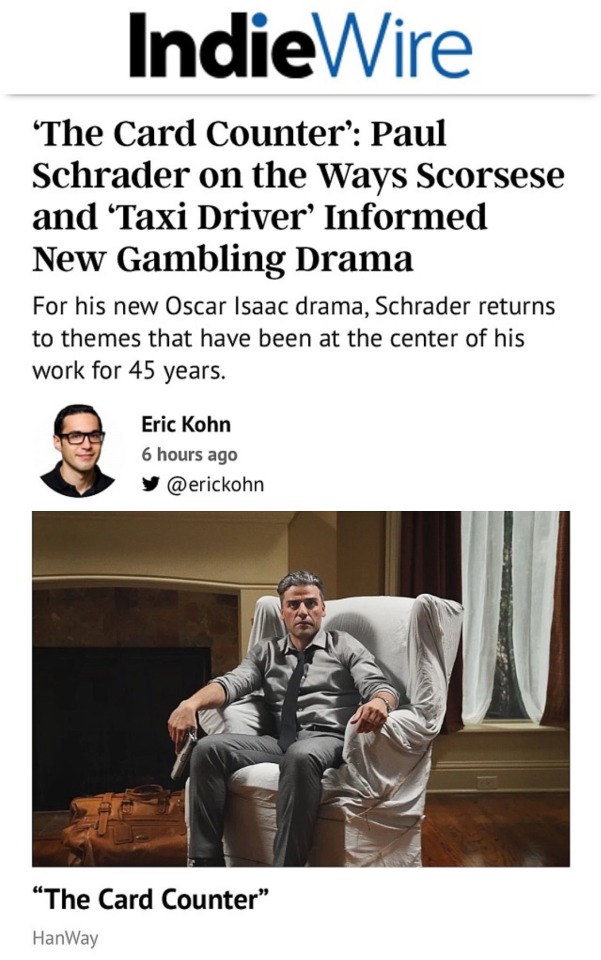
Some filmmakers write a hit movie and spend the ensuing years trying to escape its shadow. Paul Schrader never flinched. Forty-five years after his “Taxi Driver” script put him on the map, the writer-director has developed a body of work loaded with alienated anti-heroes compelled to violent and reckless extremes for the sake of a higher calling.
That includes “The Card Counter,” in which Oscar Isaac plays guilt-stricken Abu Ghraib vet William Tell, a man with a gambling addiction compelled to help the revenge-seeking son (Tye Sheridan) of a former colleague. Taking justice into his own hands, Isaac’s William Tell slithers through the Vegas strip in search of questionable salvation, not unlike a certain Vietnam vet named Travis Bickle did from the driver’s seat. As if to cement the comparisons, “The Card Counter” features Martin Scorsese as an executive producer, marking the first time the two men share a credit since 1999’s “Bringing Out the Dead.”
For Schrader, “Taxi Driver” comparisons are inevitable in all his work. “My tendency is to look for interesting occupational metaphors,” Schrader said in a recent interview. “‘Taxi Driver’ hit the bull’s eye of the zeitgeist and it doesn’t die. There’s no way I could’ve planned for that, but it does inform the stories I tell.”
At 75, Schrader continues to churn out movies much like his compatriot Scorsese, albeit on a much smaller scale. “The Card Counter” is the latest illustration of the secularized Christian dogma percolating through his work. “Our society doesn’t like to take responsibility for anything,” he said. “But I come from a culture where you’re responsible for everything. You come into the world soaked with guilt and you just get guiltier.” In his own prickly fashion, Schrader makes movies steeped in empathy for lost souls in search of redemption despite the daunting odds. “We’re all certainly capable of forgiveness,” he said, and chuckled. “Anyone who says otherwise is wrong.”
The “Taxi Driver” dilemma looms large in nearly all of Schrader’s work, from the dazzling high-stakes activism of “Mishima: A Life in Four Chapters” all the way through Ethan Hawke’s eco-conscious priest in “First Reformed.” While the latter, Oscar-nominated effort brought Schrader new fans, “The Card Counter” is an even more precise distillation of his aesthetic — a moody, philosophical drama about the vanity of the personal crusade.
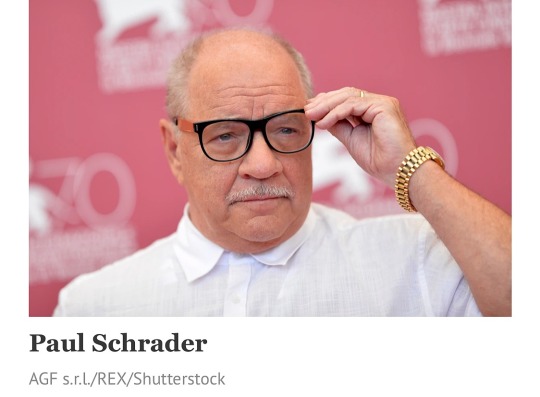
Schrader, who has labeled his homegrown character studies as “man in the room” dramas, embraces the parallels as usual. “There is this kind of myth that the taxi driver was this friendly, joking kind of guy who was a character actor in movies,” he said. “But the reality is that it’s a very lonely job, and you’re trapped in a box for 60 hours a week.” He saw the same logic with gambling, a wayward profession generally depicted in the movies in the context of escapist romps, rather than the somber rituals that afflict most players. “I thought about the essence of playing cards every day, or sitting in front of a slot machine. It’s kind of zombie-like,” Schrader said. “You see commercials of people in casinos laughing. But it’s a pretty glum place. Today with slots you don’t even have to pull the lever. You just sit there and let the numbers roll.”
The gambling figure led Schrader to the bigger picture of his character’s conundrum. “I was wondering why someone would choose to live in that sort of purgatory,” he said. “He doesn’t want to be alive, but he can’t really be dead, either. What could cause that? It can’t be a simple crime, murder, or a family dispute. It has to be something unforgivable. And that was Abu Ghraib.”
After the fallout of that debacle, William did time in a military prison, and reenters society before the movie begins. That was a world the filmmaker wanted to understand in clearer terms. Though Schrader has received blowback for his controversial Facebook posts in the past, in this case, the platform was an asset: He used it to track down soldiers who had done time in the United States Penitentiary in Leavenworth, the only military prison in the U.S., to better understand the initial claustrophobic world that Tell endures, as well as the conflict between the justice he’s received and what he deserves. “This man has been punished by his government, set free, and paid his due, but he doesn’t feel that,” Schrader said. “What does he do then? How does he fill his time? That’s how it all began.”
Schrader himself toyed with gambling when he lived in Los Angeles early in his career, but soon gave it up. “I very quickly realized I was only interested in gambling if it was really dangerous and I didn’t want to expose myself to that kind of danger,” he said. Years later, though, the experience helped inform his story. “There is this whole fantasy of gambling movies from ‘The Cincinnati Kid’ to ‘California Split,’” Schrader said. “But poker is all about waiting. People will play 10 to 12 hours a day and two to three times a day, a hand will happen where two players both have chips. Now you’ve got a face-off. But that doesn’t happen very often. Most guys who are there are running the numbers, the probability.”
He envisioned “The Card Counter” as a repudiation of the traditional poker movie, which builds to the giddy release of a final tournament. When that moment arrives in the movie, Schrader takes the movie in a bleak, shocking new direction. “It’s not really a poker movie — that’s a red herring,” he said.
William is immersed in his casino journey when he encounters Cirk (Sheridan), the crazy-eyed son of another Abu Ghraib soldier who committed suicide. Cirk blames the soldiers’ former commander (Willem Dafoe), and hopes to loop William into the plan. Instead, the older man decides to take Cirk under his wing to talk him out of the act, which doesn’t prove so easy. In the process, the gambler forms a curious bond with La Linda (Tiffany Haddish), a gambling agent and pimp whose icy, relentless drive to make the most out of the poker circuit brings William some measure of companionship on his wayward journey.
youtube
It should come as no surprise that the “Girls Trip” breakout is nearly unrecognizable in the role of the calculated La Linda, which is also a distinctly Schraderish touch: From his work with Richard Pryor in 1978’s “Blue Collar” all the way through Cedric the Entertainer’s supporting turn in “First Reformed,” Schrader has made a habit of seeking out comedic actors willing to play against type. That’s partly opportunistic on his part. “They’re eager to do it because they want to expand their palette, so you can get them for a price,” Schrader said, chuckling again. “That’s necessary, given the kind of films I make.” But that’s not all: “They will always find a way to be interesting, even when they’re not getting a laugh.”
Which is not to say that the process comes easily to them. Haddish recently told the New York Times that Schrader had to coach her out of speaking in a comedic sing-song. The filmmaker put it in blunter terms. “On the first reading of the script we had, frankly, she wasn’t very good,” he said. “I told her to go back and read every single line without emotion. Then I said, ‘You’re not going to do that in front of the camera, but you can’t hit every line either. So let’s pick five or six lines you can hit where you get a smile or reaction.’ Quickly she got that it was a different rhythm.”
As for Isaac, whose disquieting turn suggests a maniac lingering just beneath the surface, Schrader once again turned to metaphor. “I told him to imagine himself on a rocky coast in the ocean,” Schrader said. “Waves are going to come up and get you all day every day. They’re going to try to batter you. Let them. The waves will go away. You’ll still be there. Don’t compete. In the end, the rocks will win. You have to learn to trust that the way these things are put together has more power than the individual movement.”
William’s routine includes an odd ritual in which he covers all the furniture in his various Vegas hotel rooms with white paper. While the motivation is never explained, Schrader said it stemmed from an experience with production designer Ferdinando Scarfiotti on the set of 1982’s “Cat People,” when Schrader realized the man was doing the same thing. “He said, quite simply, ‘I have to live here surrounded by these ugly hotel furnishings,’” Schrader recalled. The concept inspired the new movie’s most compelling visual motif. “Casinos are very ugly places. There are no exceptions,” Schrader said. “Often you aspire to finding pockets of beauty and there weren’t really any here except the only place he could control, which was his hotel rooms, where he could privatize his visions. I came up with this ritual for him to control those visuals.”
At a certain point, Schrader himself couldn’t control the visuals of “The Card Counter” for more prosaic reasons: After an extra tested positive for COVID-19, the production shut down last March, with five days of shooting left, and couldn’t resume until July. Though Schrader initially took to Facebook to fume at his producers, the pause eventually opened up an opportunity to tweak his vision. “I edited the film and put in placeholders for the five or six scenes of consequence that I hadn’t shot,” he said. “I didn’t have a fully finished film but I could screen it for people. Normally you only get that privilege if you have a big-budget film and you’re allowed reshoots.” The early audience included Scorsese, who provided a crucial note. “I asked Marty, ‘What am I missing?’ He said to me that the relationship with Tiffany and Oscar was too thin. So I rewrote those scenes.”
Schrader asked Scorsese to take on the executive producer credit as a favor. “I said, ‘Marty, wouldn’t it be nice to share a card again? I thought it would help sell the film but it would also be a cool thing to do after all these years,’” Schrader said. “Then a couple of weeks later his agent called wanting to work out a deal. What deal? I asked Marty and he said yes. That’s the deal!” Now, the pair are trying to collaborate on a new long-form TV series based on the Bible, though the timing has been delayed by production on Scorsese’s upcoming “Killers of the Flower Moon.”
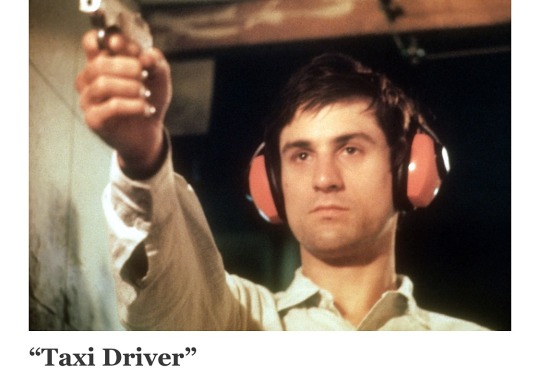
In the meantime, Schrader has been mulling over the way “Taxi Driver” not only continues to inform his storytelling but the world at large. “Hardly a week goes by that I don’t notice or hear some reference to it,” he said. “But I don’t know how you’d tell such a story today. A number of writers have tried and I don’t think they’ve succeeded because it has to come out of a certain place and time. We have plenty of these incels around, but they’re not as original or revealing as they were 45 years ago when that character came on the scene. I wouldn’t know how to write about it.”
Instead, his next project is a love triangle called “Master Gardener,” which he hopes to shoot in Louisiana before the end of the year. He has several other potential scripts ready to go after that. And while he has expressed trepidation about the future of cinema in the past, he’s not convinced that audiences have given up on it yet. He recalled a conversation he had with Cedric the Entertainer when “First Reformed” made the rounds. “He said off-handedly to me, ‘You know, I didn’t realize there were so many people who liked serious movies,’” Schrader said, and chuckled once more. “Well, yeah, there are.”
“The Card Counter” premieres next week at the Venice Film Festival. Focus Features releases on September 10, 2021.
###
#oscar isaac#the card counter#paul schrader#martin scorsese#tiffany haddish#tye sheridan#willem dafoe#taxi driver#master gardener#indiewire
35 notes
·
View notes
Text
6x16: ...And Then There Were None
Then:
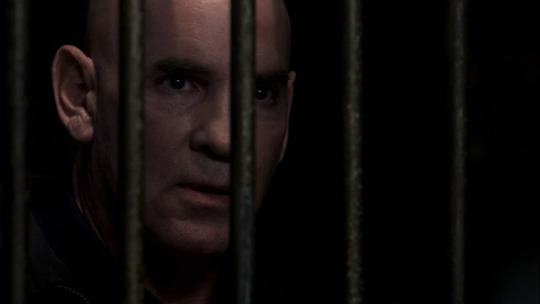
Assistant Director Skinner and Mr. X were on Supernatural and I think that’s something to celebrate
Now:
At a truck stop, Eve finds a Jesus loving trucker and asks to tell him a secret. She goes to whisper in his ear, and instead, bites into it. The trucker comes home that night and bashes his wife’s head in with a claw hammer.
Bobby fills the brothers in on a string of monster sightings alone I-80, leading to the trucker’s murder ramage on his family.
They interview the trucker, who has no memory of the event.
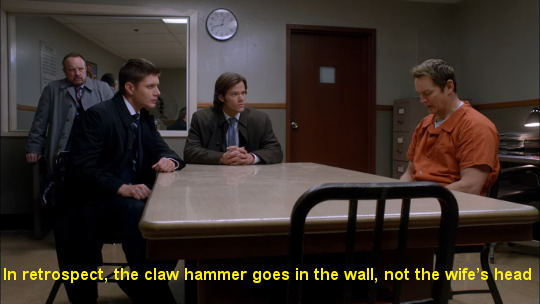
The man is beyond distraught at what happened.
The trio then looks over the truck stop camera footage and they find Eve.
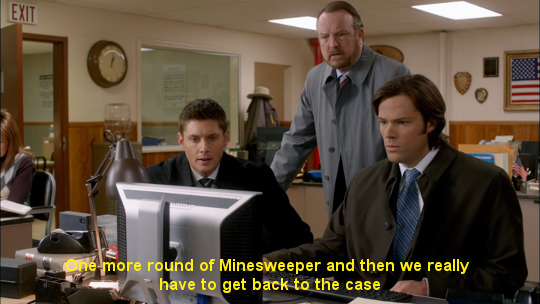
They discuss their options (Run) when the police get another call about another mass killing. Bobby heads out, only to find the FBI is already there --in the form of his old buddy Rufus.
They check out the victims.
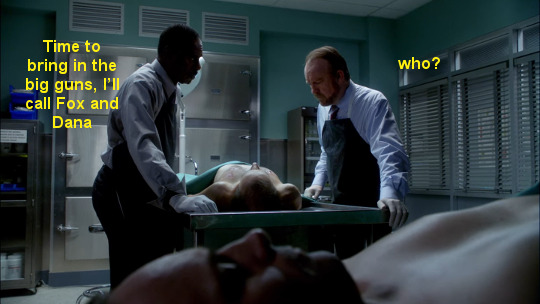
Bobby finds goo in an ear. They decide to check out the cannery where the victims worked.
They meet up with Dean and Sam and all head inside to investigate. Once there, they find the Campbell clan. Dean instantly heads to off his granddad. Sam stops him. Rufus then breaks up the family reunion to focus on the case. Samuel tells the others that Eve, the mother of monsters, is on Earth. Bobby fills Gwen in on Samuel’s little betrayal of Sam and Dean, and she heads off to talk to Dean.
She asks about Samuel, and he confirms it. He then shoots her in the stomach. WHAT? When the others rush to her, Dean is gone.
Sam tries finding his brother. Rufus tries saving Gwen’s life. Neither is successful.

They split up to find Dean, who they believe has whatever the other killers had. Rufus and Samuel find Dean.

Dean tells the group that he had some kind of slimy worm thing crawl out of his ear. They have to make sure it actually left Dean though. Bobby makes everyone give up their guns. Until they figure out where the worm is and if it’s in somebody, they have to be cautious.
With the guns locked up, Bobby and Rufus get to calling people about what they're dealing with. Samuel heads off to use the bathroom, and Sam and Dean follow.
Rufus and Bobby get no leads. Bobby suggests going after the thing “guns blazing.” “Like Omaha,” Rufus retorts. Bobby gets pissed that Rufus would bring that up.
Dean and Sam corner dear old Grandpa Campbell into a family reunion. Samuel refuses to apologize, and the Winchester lads persist in their threats of murderous retribution. Dean notices goo oozing from Samuel’s ear just in time to stop him from firing some new holes into the Winchesters. Possessed!Samuel escapes into the factory.
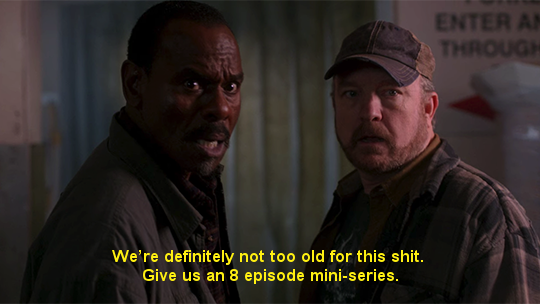
They head out into the factory - hunting together in a pack like majestic wolves! At last, Dean’s horror movie obsession helps them out. (Never split up.) They discover booby traps! This is like Goonies except without the delightful pirate treasure!
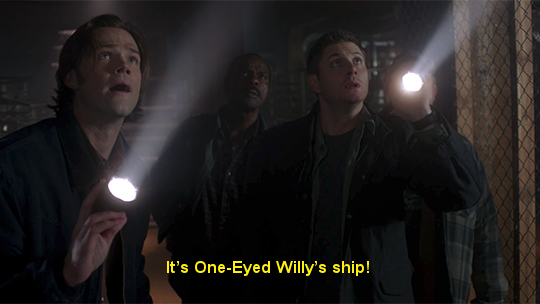
Sam gets split off from the pack and encounters Samuel - who immediately works the Sam guilt angle. Samuel closes in and Sam shoots him in the head. (It’s times like this that I really resent Supernatural naming them “Sam” and “Samuel.”) When everyone else catches up, they cuff Sam. A little later, examining the body, they discover that Samuel’s ears are clean. CLEAN! No monster ear wax! IS Sam the infected one? They determine that further autopsy is needed, so Bobby and Rufus head out to get Bobby’s cranial saw. As one does.
Sam and Dean stand vigil over Samuel, and have a broment. They talk about feelings and guilt. Sam frets over what their mom would think about Sam killing her father. Dean opines that just because someone’s blood, it doesn’t make them family. When Bobby and Rufus return, the Winchesters leave the room in a flurry of soulful looks. Bobby and Rufus prepare to crack open Grandpa Campbell’s skull.
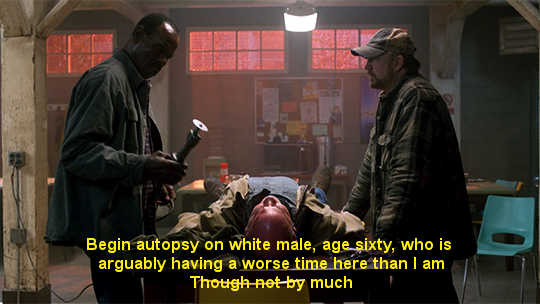
It’s Bobby’s turn to have a soulful moment over a dead body. He brings up Omaha - he should have listened to Rufus. While Rufus has spent this whole hunt exuding amused ease, he grows serious quickly when Bobby tries to apologize. “You can blab all day and it wouldn’t change a thing, Bobby,” he says angrily. “I’ll never forgive you for what happened.” Rufus advises Bobby to change the subject and my entire body goes cold and I hurt so much for these two characters!
Speaking of hurt...they start to cut into Samuel’s skull, only for the guy to wake up and start beating everyone up! (You can see where Dean inherited his not-dead-yet tendencies.) Samuel gets electrocuted and it chases the khan worm right out of his head.
They regroup, and try to figure out where the worm might have gone.
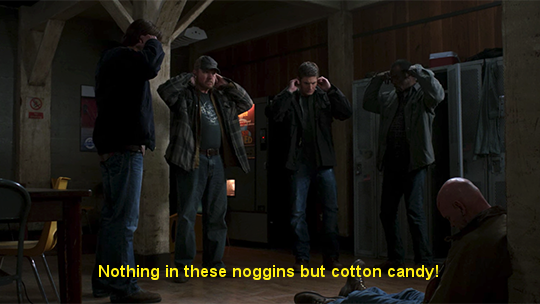
All their ears turn up clean, but Sam proposes electrocuting everyone to see if they’re possessed. Sam. Sweetie.
Dean volunteers to be electrocuted first. Dean. Sweetie.
They electrocute Sam, Dean, Rufus, and….Bobby tries to decline. As Rufus approaches, Possessed!Bobby stabs him. UGH. This is why I don’t rewatch this episode. RUFUS NOOOO!!!
Bobby wakes duct taped to a chair.

The worm speaks through Bobby. Enough people have died today, Possessed!Bobby posits. Do they really want to endanger Bobby’s life to defeat one little worm? Anyway, the worm’s eager to talk. “New monster just dropped,” the worm announces proudly (paraphrasing). Eve made him and she’s going to make monster-topia on Earth. She’s sent the worm to them with a message: “You’re all gonna die.” (I have to say, that packs a bigger punch than, say, scrawling “I am coming” on an angel’s chest.)
They tape over Bobby’s mouth, nose, and ears and order Bobby to hang on. They’re gonna fry themselves up a worm! (But hopefully not a Bobby.) The worm drops out of Bobby’s electrocuted body eventually and we end the scene with Sam breathlessly announcing that “he’s not breathing.”
Cut to the Winchesters standing over a fresh grave. Dun dun DUN.

Bobby joins them, and we’re left to mourn Rufus. He eulogizes Rufus: Bobby was just a mechanic until Rufus saved him from his possessed wife. Rufus taught Bobby all about hunting. They hunted together for years, until Omaha. Dean tosses his opinion in before Bobby spirals too far down the self-recrimination slide. Rufus should have forgiven Bobby because “life’s short. And ours are shorter than most. Are we gonna spend it wringing our hands? Something’s gonna get us eventually. And when my guts get ripped out, just so you two know...we’re good.” Dean offers a blanket absolution. Then Sam and Dean wander off as it starts to rain, leaving Bobby to drink and mourn his friend.
Long Live Rufus Quoter:
C’mon man, it’s not rocket surgery
Somebody needs a hug
Monster possession? That’s novel
If anything crawls out of anybody, somebody step on it
This can’t be my afterlife, ‘cause the three of you are here
Want to read more? Check out our Recap Archive!
#spn recap#dean winchester#sam winchester#bobby singer#rufus turner#Samuel Campbell#spn 6x16#and then there were none#supernatural season 6
26 notes
·
View notes
Note
I always thought enji would try to not show any violent tendency in front of y/n (not sure how that would work since they all live in the same household, but let’s just say he manages), thus leading to her not believing her siblings when they tell her her daddy is not as good as she thinks he is. Either way, when she finally sees that what they said is right, she kind of goes into denial, but finally accepts that’s just who her daddy is and sees that he’s actually trying to change and make things better.
Not sure how she would handle the whole touya thing tho.
hello nonnie o(≧▽≦)o thank you for sending in ~
it’s interesting. in my papa!enji au though she was treated the same like touya and shoto bcs hey todorokis are expected to be heroes. in this au y/n inherited enji’s flame based quirk which later on developed into black flame. after touya’s physical condition discourse she was trained with shoto, both of them got yelled at but shoto’s got it worse since his obviously younger and thus his ability is not as good as hers yet at the time, but ofc enji and his legendary he’s already five. she’d shield him from whenever enji’s angry (that’s why her siblings are so attached to her).
as life progresses and shit happens along the original official plot of bnha, touya was still ‘dead’, natsu and shoto still ended up resenting enji, she’s the one who’s still there. in this papa!enji au she stays with enji because she knows what genuinely happened, how enji just wanted to protect touya (in a way), her mother’s incompetence, things her siblings never saw since they were too small. she’s the one who saw how touya’s inccident hurt him, she’s the one who saw how enji trashed the training room out of grief and frustration and not rage. she’s the one who first found shoto when her mother threw boiling water at him, her still small steps running to the house phone to call her papa, she’s the one who despite the dirty looks from her brother knows too well how he got her mother the best treatment money could provide and still brings her favorite flower everytime (a habit she silently hates).
that’s why it hurts her too when people badmouth him, enji’s good at doing hero work, he genuinely protects people, occasionally even risking his life while at it. she hates it so much because no one sees what she sees, everyone only knows the gruff number one hero endeavor who’s gaze never falter, no one knows about the agonizing hours she’d spend waiting at the hospital being scared shitless and flinching everytime she sees residents and nurses walking back and forth. sure he had his share of faults, but having his sons despise him was a fair punishment. he’s trying his best to do what he can so his family can be happy, even without him in the picture.
when enji built a new house for her mother and his children, y/n was the last person he talked to about it. the house was built quickly and soon it’ll be ready to welcome her mother’s discharge and maybe to be a home for her brothers. i actually wrote a drabble about what happened when he proposed the idea, and so their relationship starts from that night.
about the touya arc though, i don’t read the manga so i can’t yet create a proper scenario for this but i read a page or two on pinterest and boy did it break my heart sigh. on a director’s commentary, i feel so bad since on the other hand i can’t see any alternate scenario,, even so i do know y/n will do anything in her power to support enji. her only nii-san touya died the moment he decided murder was an acceptable coping mechanism.
i hope this makes sense im sorry >_<
51 notes
·
View notes
Text
Come play with me Part 2
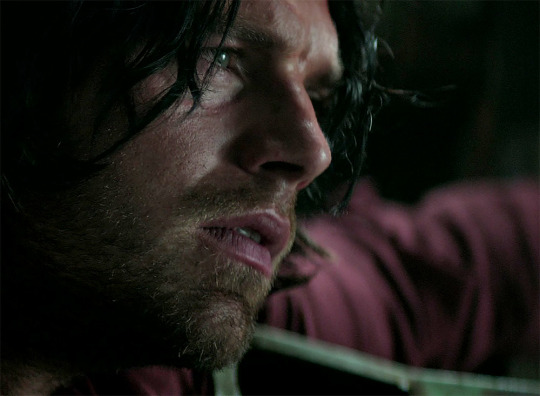
Pairing: Bucky Barnes x Reader
Warnings: yandere, obsession, cursing, allusion to non-con.
Words: 2060.
Summary: Having to deal with Bucky Barnes, a talented head engineer who you have to convince cooperating with your boss, you suddenly discover his psychopathic tendencies. Worse, he has taken an eerie interest in you.
Part 1
P.S. More references to “Death Machine” movie I saw when I was a kid 🙈
_______________
Nervously glancing around a messy room full of odd equipment, screwdrivers, nails, military clothing like combat pants, and scary drawings hanging on the walls, you sat on an empty chair Barnes had offered you. In fact, it was the only empty chair in the room.
“Yeah, I need to clean up, I know.” He muttered under his breath, grabbing a pile of papers on his seat and dropping them to the floor close to his table as he started typing something on his laptop. “Never have time for this.”
You nodded, pretending you cared. Actually, the only thing you wanted was getting away as far as you could from Barnes, a man who had completely turned your life upside down in a matter of hours.
First, as you tried fighting him, he had blocked all your cards and literally stripped you of all your money - you couldn’t understand how the bank security overlooked the transfer, but all you had left were ten dollars on your account. When you got hysterical, crying and pleading Bucky to get it all back, he carefully explained to you that all you needed to do was to listen to him. You were still furious, remembering how he talked to you as if you were a child.
Then Barnes told you he would have what he wanted anyway, but he didn’t need to break you in the process. It wasn’t fun, he said, albeit having you cry under him as he sat on top of you laying on your bed. When you finally submitted, knowing you couldn’t overpower him, that bull of a man, Bucky returned you your money, adding a few thousand dollars “for the trouble”. You had never felt so humiliated in your entire life.
You chose not to think of what had happened after that.
“Shit, they fucked it up again.” Bucky growled in frustration, rubbing his eyes as he stared into one of several monitors on his desk. “Baby, can you make me coffee while I’m dealing with this shit?”
What? Coffee? Did he bring you here for this?
Clenching your fists, you kept your mouth shut as you glanced over the room, quickly finding a dirty coffee maker in the corner. Trying to convince yourself it was better than giving him a blowjob while he was working, you moved from your seat and went to have a look at the little glass kettle. It definitely needed a good wash, so you disconnected it and headed to the door. While passing beside Bucky’s back, you were abruptly stopped by him tugging on your pencil skirt.
“Where do you think you’re going?” He growled, narrowing his eyes at you. There was something carnivorous in his gaze as he watched you freezing in place.
Showing him the coffee maker, you nervously said, “It’s dirty. I want to clean it before making coffee for you.”
He blinked for a few times and let go of your skirt. Lifting his eyes to your face, he softened, motioning to you, “Kitchen’s on your left. Thanks.” As he turned back to the monitor, making no attempt to stop you, you carefully moved forward, stopping yourself from running away.
When the door closed beside you, you finally exhaled as if you escaped the death room with a deranged psycho with an axe in it. Well, the deranged psycho was actually there, but without a weapon, you hoped. Not that you saw any.
Speeding up, you found a kitchen on your left just as Barnes said, relieved no one was there - for some reason, you were afraid of his co-workers since none of them had reported Bucky before... Come to think of it, maybe they did. But HYDRA wiped everything out because Barnes was irreplaceable, and until he murdered someone the company was probably okay with pretty much everything he was doing if he continued to work for them. Or were there any boundaries at all? If Barnes was a murderer, would the company cover him up just because he was the one making billions for them?
You threw away the used filter and placed the kettle into the sink. You needed to find a way to leave him, but as careful as possible. No one knew what Barnes was capable of.
The smell of coffee made Bucky finally snap back to reality as he inhaled the aroma, stretching his arms while you watched his muscles flexing. Despite him looking pretty good, you were more scared rather than aroused.
“Here.” You said, placing a cup of black coffee in front of him - no milk, no sugar just like he instructed you.
Barnes grinned at you, tucking a strand of his dark hair behind the ear, and the next moment you ended up on his lap as he gripped you by the waist, then taking his coffee like it was something completely natural. Stilling, you squirmed uncomfortably, unwilling to be so close to him. He was acting as if you were his girlfriend, and you were not okay with it, but preferred being silent rather than having an argument that could lead to Barnes becoming violent.
“Thank you, doll.” He whispered, leaving a quick kiss on your cheek, and you winced from a sudden feeling of his three-days beard brushing against your sensitive skin. Bucky proceeded to sip his coffee and stare into the monitor, a dozen of blueprints opened at the same time didn’t bother him, seemingly.
You had been tense for a couple of minutes before you realized Barnes was completely absorbed by his work, caressing you through your clothes with his hand from time to time, but doing little else. All he saw were numerous reports and blueprints. Sometimes Bucky was getting upset when a small window with a chat popped up above his programs, and he hurriedly typed a message to some of his colleagues, you supposed.
Since there was nothing much left to do, you tried to understand what Bucky was working on. In the end, it was going to be your job - he had already submitted all the forms to get you a position of a project manager. You didn’t know how HYDRA’s executives was gonna react, but something told you Barnes could convince them to do as he pleased. Even the thought of that was frightening to you.
The more you watched, the more you thought the new project didn’t remind you the weapon control system but the weapon itself. Of course, you weren’t an engineer, but you had a good knowledge of HYDRA’s already existing active protection systems. This wasn’t it even in the slightest. It was more of some weird cyborg thing, you thought as you kept looking at what appeared to be biomechatronic body parts.
Was he working on some side project now? Was it even HYDRA’s project?
As you leaned closer to the monitor, trying to understand what this was and why Barnes was working on it, your heard the man chuckling.
“Interested?” He asked, making you lean back into him with his hand pressed to your chest.
“I thought you were working on the new weapon control system. What’s this?”
“Oh, this is the best thing I’ve ever done, baby. It will bring HYDRA to the top of the world.” Grinning, he closed the blueprint he was working on and opened a different one, a colored 3D model of a heavily armed man wearing something that almost looked like a futuristic military suit. “This is the Supersoldier project, the top-secret thing Pierce wants me to be the lead of.”
Pierce. Alexander Pierce, the new CEO of the corporation who took this position after Fury’s dismissal. Did he give Barnes a secret project? Why on Earth did he want HYDRA to be involved into weapon production? It was beyond corporation’s reach. They simply didn’t have the permission, never cooperating with military for this purpose. What Barnes was doing was illegal.
“So, is this why you don’t submit the new reports?” You asked, trembling slightly on his lap and almost missing a kiss Bucky left on the back of your neck. It was better not to ask too many questions.
“You don’t understand.” He laughed, making you turn your face to him as he caressed it with his gloved hand. “There can be no reports because there is no new weapon control system. It had never been planned. Your boss won’t have any details, because there are none.”
You felt your head spinning. What? What? How could it be? The Board of Directors wanted that project. You were sure most of them knew nothing about the thing Barnes was working on now. It was simply unbelievable. The head engineer of HYDRA’s Corp was involved in an illegal project to create a cybernetically-enhanced soldier, and no one knew of it.
You were becoming involved in something very, very dangerous. People like Alexander Pierce and the ones he was doing this project for were much scarier than a psychopathic genius Bucky Barnes.
Fuck. You were in deep, deep trouble.
“Mr. Simons will get fired then, I see.” You mumbled, trying to find words and talk about something that wouldn’t involve the Supersoldier project. The more you knew, the shorter your life would be, you feared.
“Sorry about that, doll.” Barnes’ smirk was irritating at best. “But I really need you here with me. This project is quite stressful, and when I’m stressed, I don’t work well. Last time I’ve fucked up my arm completely.”
“Your arm?”
“Huh, you didn’t see?”
Oh, you didn’t like it. You didn’t like it when Barnes lifted his arm and took his leather glove off, revealing a metal hand instead of a flesh one. He then rolled the sleeve of his thick hoodie further, and you realized his whole arm was made out of metal.
Barnes was experimenting on himself. He was that first supersoldier Pierce wanted.
As you looked at him with an expression of utter horror written on your face, Barnes chuckled, making you lean closer to him and kissing you deeply, his tongue licking the insides of your mouth shamelessly while you froze, unable to accept the truth. When you touched his metal fingers, they radiated heat as if they were of flesh and blood. How was it possible? Why Barnes was doing this? Didn’t he understand why Pierce wanted him to work on this project and what he was going to do with it once Bucky finished?
No, Barnes knew. He was anything but stupid. Maybe he wanted HYDRA to have its own supersoldiers. Maybe Bucky wanted this power.
“I’m a war vet, baby. I’ve lost my arm around ten years ago.” He said as he touched your skin with his metal hand. “Dealing with those shitty prostheses was a nightmare, believe me. But look at this - it’s perfect. I can draw with it - and I can crack Pierce’s skull just as easily. Isn’t a miracle? You didn’t even realize what I had there until I showed you.”
“I don’t think people will call it miracle when Mr. Pierce makes his personal cyborgs army.” You said quietly and shivered from the thought. It was unbelievable, like a plot of a sci-fi movie or something, yet you were staring at Barnes’ metal arm now. If anyone could make this horror a reality, it was him. “Why are you doing this? Don’t you understand what’s going to happen?”
“What? Like a war or something?” He asked with irritation, watching you frown. “Since I’ve returned home, there was not a year without a war somewhere on Earth. This peace pacifists are talking about exists only in their idle imagination. So why not to be prepared in advance, huh? Besides, it’s so much fun, baby. You’ll see soon.”
As you attempted to stand up, he squeezed you with his solid, beefy arms, bringing you closer so you sat back on his lap, spreading your legs while Bucky made you face him, caressing your thighs. Your face was burning hot as your skirt got up, baring your silk stockings.
“I’ll show you everything you want to know.” He breathed into your face, and you felt Barnes was becoming hard, his dick brushing against your core covered by pretty black laced panties as he made you roll your hips, touching your back. “But let’s do it after a small break, ok?”
_____________________
Tags: @finleyjayne @alexakeyloveloki @helenaeisenhower @villanellevi @hurricanerin @void-hoechlin @abyssaint @heeeyitskay @chris-evans-indian-fanfic @navegandoaciegas @rosalynshields @brattycherubwrites @sllooney @angrythingstarlight @iheartsebastianstan @soleil-dor @iheartsebastianstan @lookiamtrying @buckysbunny
#bucky barnes x reader#dark bucky barnes x reader#bucky barnes#dark bucky barnes#winter soldier#yandere
171 notes
·
View notes
Text
Isabelle Huppert: The Most Dangerous Actress in European Cinema
Etre actrice, c’est avant tout faire l’apprentissage de sa liberté.
- Isabelle Huppert
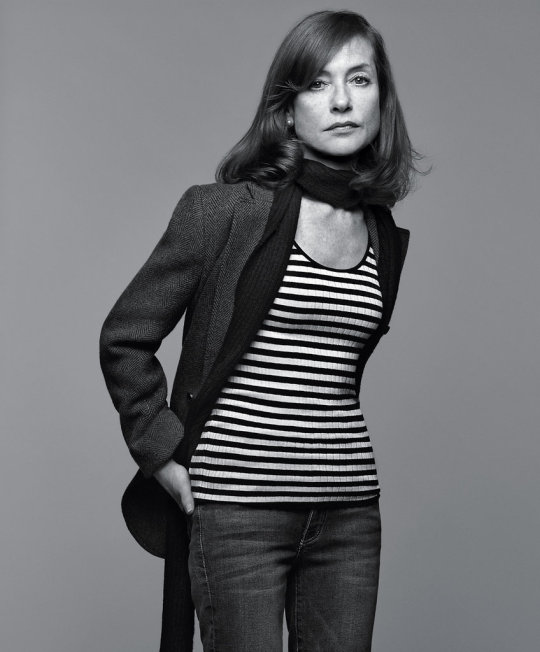
At 66 years old, Isabelle Huppert has had a long, celebrated career and is regarded in the highest echelon of French actors. Among actresses, Isabelle Huppert holds the record for César Award nominations (France’s Oscar award), with a whopping sixteen. She has also had twenty of her films in competition at Cannes, more than any other actress. And she is among just four actresses who have won the Best Actress prize at Cannes twice.
Not a bad track record.
Though she has appeared in a few American productions over the years, including “Heaven’s Gate” (1980), “The Bedroom Window” (1987) and “I Heart Huckabees” (2004), her best films have all been European.
Extraordinary women marked by tragedy and surrounded by mystery — these are Huppert's trademark cinematic roles. The films of Isabelle Huppert tend to be filled with sociopaths, self-mutilators, and murderers.
There was the jealous postmaster in “La Cérémonie,” the gun-toting young bride in “Coup de Torchon,” and the prostitute who poisons her family in “Violette Nozière. “The Piano Teacher,” “Elle” and “Greta” would make a crazy triple feature. Overall Isabelle Huppert, one of the iconic dames of French cinema, has garnered a reputation for being cold and steely. The French actress, now in her mid-60s, consistently chooses roles that are morally complex and sometimes hard to watch. And yet we can’t bring ourselves to look away.
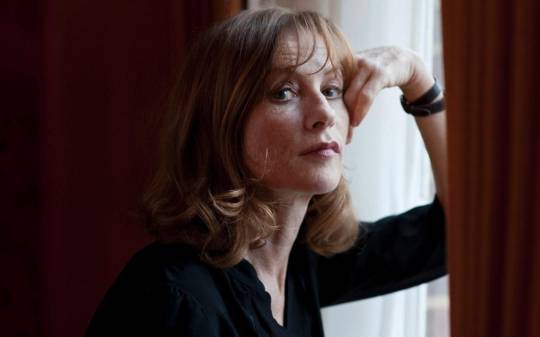
Susan Sontag, who once called Huppert “a total artist,” said she had never met “an actor more intelligent, or a person more intelligent among actors.”
Huppert has been called France’s Meryl Streep for her technical skill, but for all her shape-shifting, Streep’s strongest women have never gone so dark as the roles Huppert has played.
Huppert expresses the moods and mental state of her characters with precision and great sensitivity. Her seemingly expressionless face and sparing facial expressions have become something of a trademark.
Fiction has a tendency to inflate things, she said once in an interview with The Financial Times in July 2017. "But when I look at people on the street, I find that most of them are pretty empty in their eyes. I have to do even less." To observe, she has been taught, you have to take away, not add something.
Isabelle was the youngest of five children, born in Paris to an engineer father and a mother who taught English. Her mother is credited with spotting her talent early on, and encouraging her to develop it. She was already well on her way as a teenager, getting acting jobs while studying at the National Conservatory of Dramatic Art in Paris.
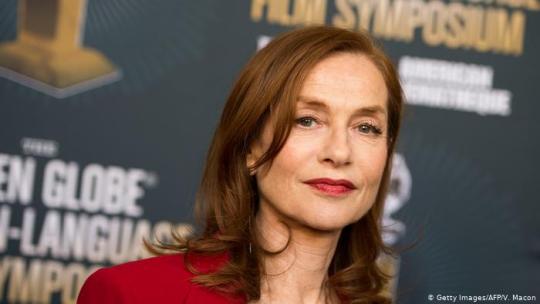
Huppert’s résumé is remarkable over five decades: Just over 140 films since her debut in 1972, for many of cinema’s most audacious visionaries, including Claude Chabrol, Claire Denis, Curtis Hanson, Hal Hartley and François Ozon.
In “Things to Come,” a wistful, funny drama by the French director Mia Hansen-Love. She plays Nathalie, a Parisian philosophy teacher whose husband leaves her for a younger woman, whose mother dies, whose publisher won’t reissue her book — and yet, who finds unexpected freedom in all of these losses. Nathalie heads toward the light and Michèle toward the dark, but both roles showcase Huppert’s great ability to derive power from vulnerability.
What directors loved about Huppert — and she prides herself on being an auteur’s actor — was her ability to convey moral complexity in the most unique ways.
Working with such auteur directors, Huppert can inhabit extreme characters — "survivors who can be victims and rebels simultaneously," says the actress. "My films give these women a voice. Because even though they live on the edges of society, they are there: women who live brutal lives. It's a brutality that they themselves never sought out," Huppert told Zeit Magazine.
Paul Verhoeven who directed her in “Elle” described Huppert as a “pure Brechtian actor,” in that she puts distance between herself and the audience, without trying to seduce it or seek its sympathy.
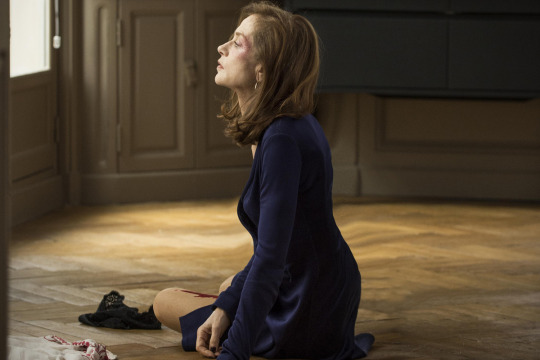
The actress is notorious for her illegibility - her almost Bressonian lack of expression, and the profound unrest she’s able to convey from behind the stillness of her freckled resting face. Pauline Kael, the famous film critic, once complained that “when [Huppert] has an orgasm, it barely ruffles her blank surface.” If Kael had lived to see “Abuse of Weakness,” “Elle,” or “I Heart Huckabees,” perhaps she would have come to appreciate how the stillness of Huppert’s unbeatable poker face allows her to normalize even the strangest and most perverse of characters; to make it seem as though any of their behaviors, no matter how unusual or demented, are as natural to them as we are to ourselves.
It’s a quality that European directors and audiences have embraced, but which can seem more foreign to Americans. Huppert loves American cinema, but she also knows her sensibility is distinctly French.
Huppert is known for her privacy and reserve - she generally doesn’t talk to the press about anything other than her films - and if there’s a connection between her autobiography and the roles she chooses, that’s something that only she knows.
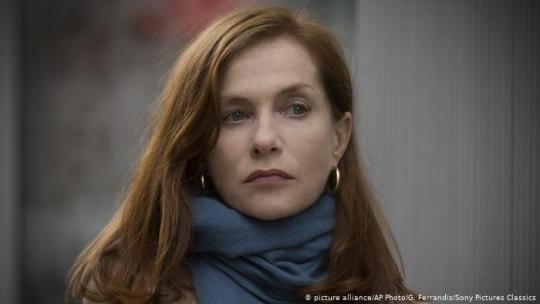
Aware of her own enigmatic appeal, she has no qualms about exploiting it. She has even less desire to charm, although her formidable impassivity sometimes betrays a hint of vulnerability. Not that she will let the viewer get too close, however, as she is forever intent on remaining “more like a question mark than a statement”.
Isabelle Huppert is not just courageous when it comes to choosing film roles and artistic collaborators. She is fearless, and such is her integrity that we trust her instincts and follow wherever she leads. That’s what makes her the most dangerous actress of our time.
Below is a top ten list of Isabelle Huppert films. They are not in order nor are they her very best. There are simply too many films in her body of work that would deserve equal consideration. Instead the list is made up of films that given an introduction to her wide ranging talents.
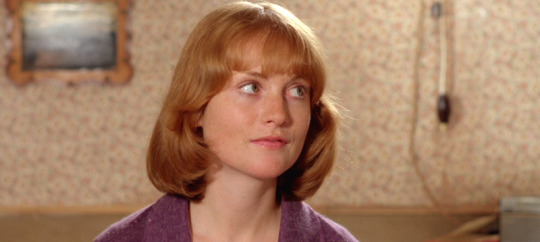
1. The Lace Maker 1977
Isabelle Huppert won the most promising newcomer award for her graceful, guileless performance as Pomme in Claude Goretta’s masterly adaptation of a Pascal Lainé novel, which took its title from a Vermeer painting. Whether doing her chores at a Parisian beauty salon, playing blindman’s buff on a Cabourg clifftop with dashing Sorbonne student Yves Beneyton, trying to eat an apple without disturbing his reading or choking over dinner with his snooty parents, Huppert is mesmerising.
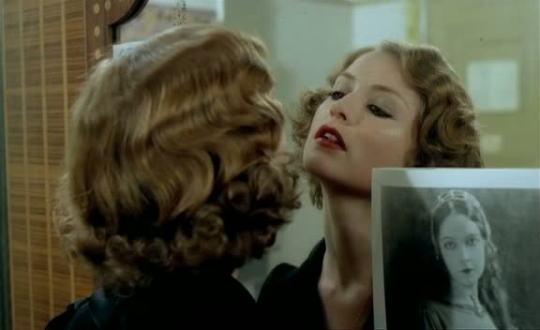
2. Violette Nozière 1978
The first of her seven collaborations with Claude Chabrol earned Huppert the best actress prize at Cannes. She was 25 when she played the demure schoolgirl who shocked 1930s Paris when details of her double life as a prostitute emerged following the poisoning of her father. Violette claimed he had abused her, but Chabrol thinks otherwise and exploits Huppert’s genius for switching between fragility and cruelty to counter the surrealist myth that the teenage parricide was an anti-bourgeois icon.
Huppert embodies this character that’s chiefly concerned with finding love. She walks the streets at night, characteristically promiscuous, but don’t call her a prostitute. She’d refute. Throughout the film, she gives more money to the men then vice versa. At night, when she leaves her quiet bourgeois home, and finds a man to accompany her, she looks unusually bothered. The film is sometimes maddeningly ambiguous but perhaps that’s the point - Chabrol and Huppert want us to feel mixed about her.
Violette is a woman with an air of mystery around her. She’s precocious but not as clever as she thinks. Huppert gazes and kisses her own mirror reflection. She writes fictional love letters to herself as well. Huppert quietly stresses the motivation behind the character: desperate to find someone to love, or else she’ll have to love herself. Except, she can’t even love herself because she feels stifled by her home life. And as ever with narcissism, there are dangerous consequences.
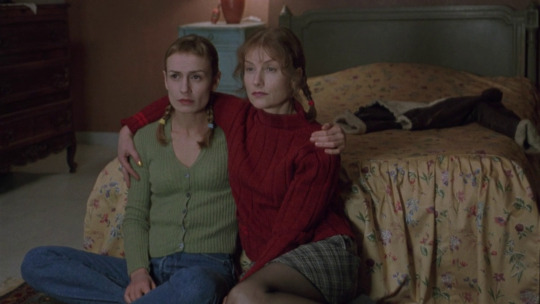
3. La Cérémonie 1995
“Chabrol only ever cast me as fairly ordinary characters,” Huppert once revealed. “They just have rather particular destinies.” While she would go on to embody Chabrolian womanhood (“not victims, not fighters, somewhere in between”) in Rien ne va plus (1997), Merci pour le chocolat (2000) and Comedy of Power (2006), she gave her finest performance for him in this seething adaptation of Ruth Rendell’s A Judgement in Stone.
An upper-class family warns their meek maid (Sandrine Bonnaire) about the local mail lady, Jeanne (Isabelle Huppert). They become friends regardless. Huppert plays Jeanne as kooky, comic, and rebellious. We gradually find out more cryptic background on her character, which gives her spirited attitude a darker edge. She’s either heartbroken or heartless. Huppert portrays a character with so many contradictory traits without ever making it feel false.
Huppert performs the role cunningly. Jeanne is energised like a child, but she’s smart enough to know how to win over the maid. She’s a little silly - when she enters the family’s home while they’re away, she touches everything. Huppert balances all of this next to the near-mute Bonnaire, both slowly exacting their revenge against the upper class. Chabrol’s trademark: clash of the classes.
Huppert thoroughly deserved her first César.
In 2014, Huppert performed Jean Genet’s play The Maids with Cate Blanchett. The play was inspired, as was La Cérémonie, on the same true-story about the Papin sisters.
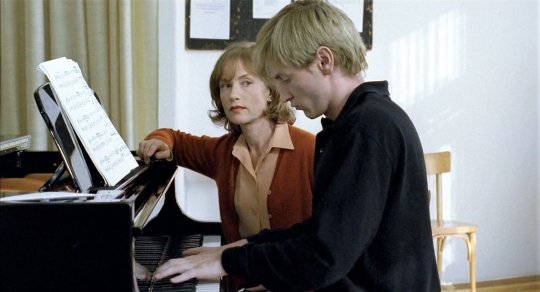
4. The Piano Teacher 2001
The Piano Teacher is an elegantly made film about the deranged endeavors of love. Huppert plays a buttoned-up music instructor, Erika, who attracts the eyes of an unassuming man half her age. She still lives with her mother and there’s a danger that lurks behind her carefully placed gaze. She’s been sexually repressed for such a long time; her repression and self-hatred has slowly evolved into masochism. It drives her to haunt peep shows, spy on copulating couples and mutilate her own genitals. This disturbing film really made an impact world wide.
Nobody said this film was an easy watch!
Haneke gives the spectator all the intricacies of the concept of perversion inserted in Huppert’s character of Erika, a successful piano teacher and an apparently impeccable social life. Well, that’s what Erika keeps on the surface.
Huppert declared the second of her four collaborations with Haneke to be the film she had long been searching for.
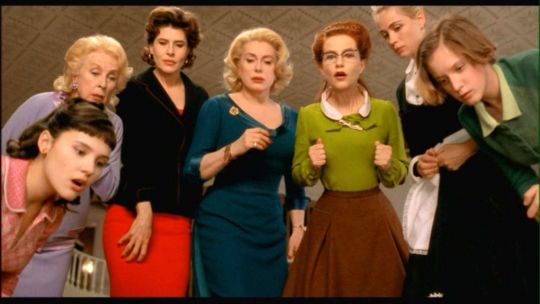
5. 8 Women 2002
There’s no validity in the truism that Huppert doesn’t do comedy. In fact she proved she could both dance and sing (the plaintive ‘Message personnel’ is a career highlight) in François Ozon’s chic 1950s musical whodunit. Sporting a tight bun, a buttoned-up twin-set, pursed red lips and butterfly spectacles, Huppert invokes the spirit of legendary farceur Louis de Funès as Catherine Deneuve’s argumentative sister. She gives an indelible display of neurotic, spinsterly bitchiness that is simultaneously piteous and hilarious.
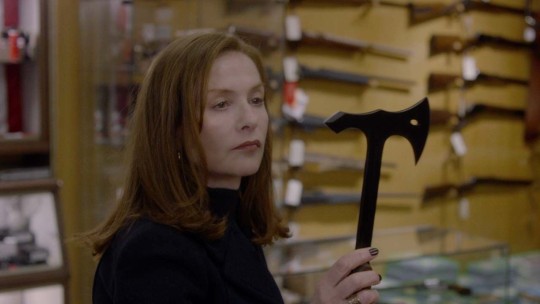
6. Elle 2016
A successful woman enters a real ordeal after being raped by a stranger in her home. Powerful, ‘Elle’ unravels all the nuances of a character’s life inserted into a completely incongruous personal, social and psychological reality. Here, the character will demonstrate how her attitude towards the world follows a sociopathic pattern of acting, despising any form of emotional attachment and using other individuals solely to satisfy her most primitive instincts. The film earned her an Oscar nod for Best Actress, which was fabulous but also made me wonder what took so long. Certainly she’s turned out enough superb performances over her nearly five decade career to have earned this recognition sooner.
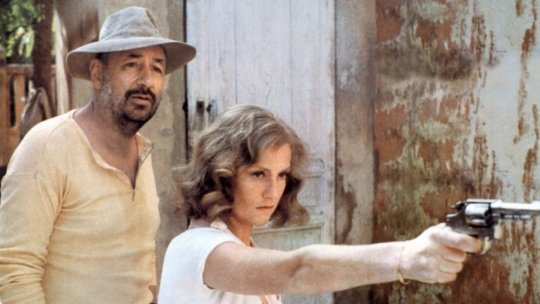
7. Coup de Torchon 1981
Having survived a seven-month stint in Montana for Michael Cimino’s Heaven’s Gate(1980), Huppert ventured to Saint-Louis in Senegal for Bertrand Tavernier’s Oscar-nominated transposition of Jim Thompson’s pulp novel, Pop. 1280, from a small Texan town in the 1910s to west Africa on the eve of the Second World War. Although Pierre-William Glenn’s sun-scorched Steadicam imagery seems antithetical, this is a darkly droll noir that sees Huppert in an unusually skittish mood, as the abused colonial wife who forges an unlikely alliance with Philippe Noiret’s pathetic rogue police chief, who is humiliated by everyone around him, and suddenly wants a clean slate in life - but resorts to drastic means to do so.
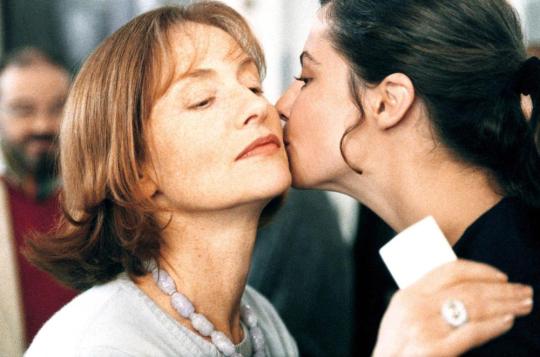
8. Merci pour le chocolat 2000
The film follows the nuances of a French upper class family, exploring the destructive ways in which each member acts on the world. Directed by Claude Chabrol, ‘Merci pour le Chocolat’ is an interesting film, bringing a more cadenced plot that values studying each meander of the behavior of its central characters.
The movie is set in Lausanne, and that Swiss location, having an ambient sense of buttoned-up severity and menace, is an appropriate setting with a Nabokovian mien for this horrid tale of sociopathy.
Huppert dominates the film with the slightly frigid poise of a great dancer who has retired to become an exacting teacher. She plays Mika, a woman who presides wearily and almost negligently over the prosperous chocolate business built up by her late father. But however disengaged she is in the boardroom, in the kitchen she loves chocolate with a passion - concocting various types of drinking chocolate, using subtly differing recipes, with fanatical and murderous care.
There is something fascinating about Huppert's face here. In repose, it has a kind of unsettling serenity, the serenity of a cunning and covert predator who has already decided on an unspeakable course of action.
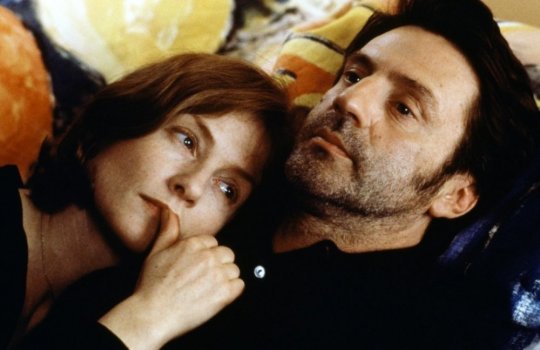
9. La Séparation 1994
Isabelle Huppert and Daniel Auteuil play a couple on the verge of a separation. The relationship’s mainstay is their child, one-year-old Loulou. Autueil gets most of the film’s focus, but he’s essentially a sitting duck, nervously shifting between passive-aggressive contempt and hopeful endearment, as he prepares for the outcome of his girlfriend’s infidelity. He says, “Never two without three.” This could be the quote-totem of the film.
The director smartly leaves the interloping lover out of the film (he’s never seen or even named). Instead, we study Auteuil’s growing impatience and Huppert’s pivotal decision. She adds a lot of depth to a character that could’ve just been the unsympathetic partner of the cuckold.
Huppert gives her character integrity and even though she’s ostensibly guilty, she never comes off as purely selfish. She’s troubled, as well, by their situation - we sense her detachment not due to ego but because she’s boggled in trying to assess the right mode of conduct. Huppert and Auteuil have great chemistry, changing gears effortlessly between vitriol and affection.
Huppert’s distinctive talent for suppressing suffering is readily evident in her slowly disintegrating relationship with Daniel Auteuil, as Huppert imparts chilling intimacy to a withdrawn hand, an unanswering gaze, a treacherous silence and a careless word in conveying the pain of falling out of love.
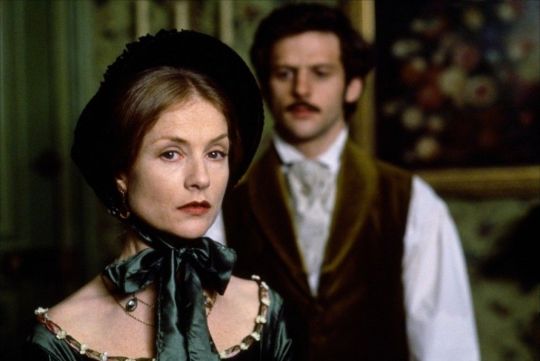
10. Madame Bovary 1991
Not her greatest film but certainly one of the most accessible for anyone not familiar with the talents of Huppert. Based on Gustave Flaubert’s fabulous novel, the film brings the exacerbated trajectory of a young girl who has a highly romanticised view of the world and craves beauty, wealth, passion, as well as high society. It is the disparity between these romantic ideals and the realities of her country life that drive most of the novel, leading her into two affairs and to accrue an insurmountable amount of debt that eventually leads to her suicide.
This adaptation of ‘Madame Bovary’ is perhaps the best of any adaptation to date. Claude Chabrol manages to capture even the most emblematic nuances of Flaubert’s book, elevating a unique atmosphere for the unfolding of scenes.
However, the main point of distinction between this work and the others is the presence of Isabelle Huppert as protagonist, delivering a powerful and visceral performance from the first to the last scene.
#isabelle huppert#film#cinema#french#france#culture#art#actress#acting#artist#icon#femme#huppert#french cinema
155 notes
·
View notes